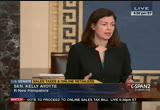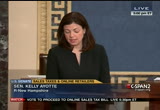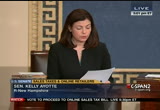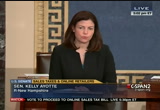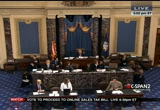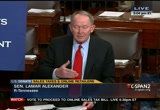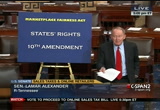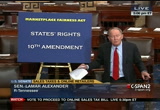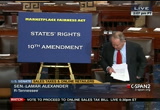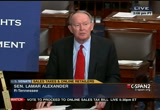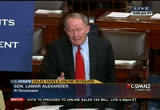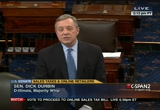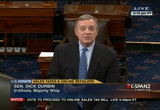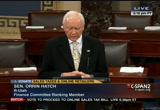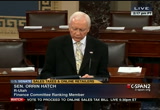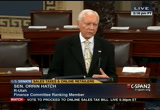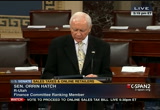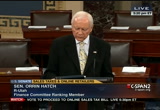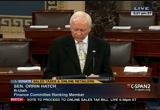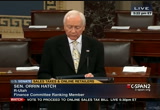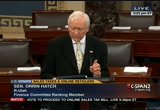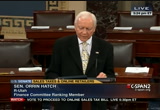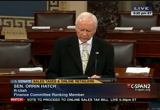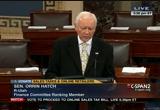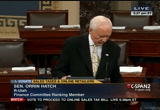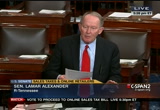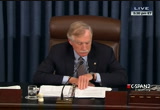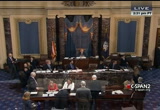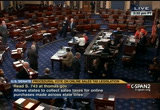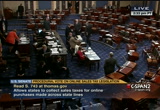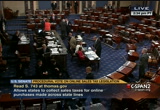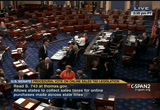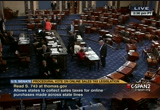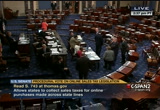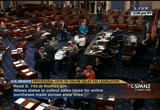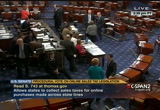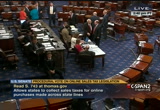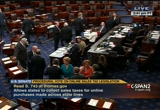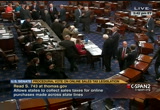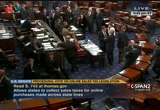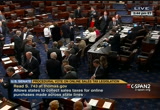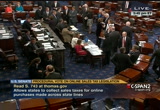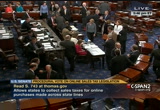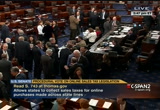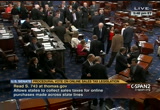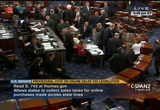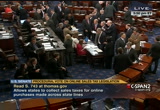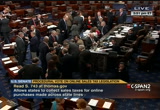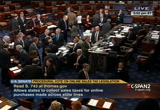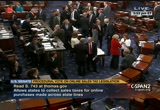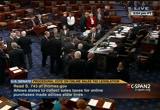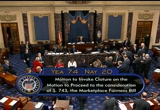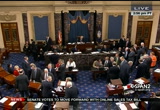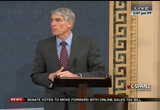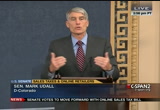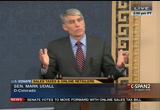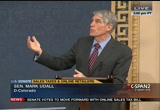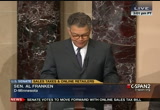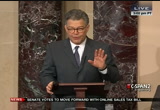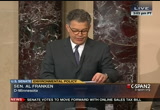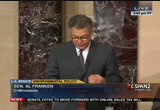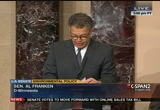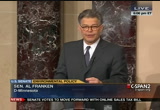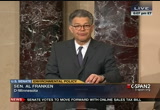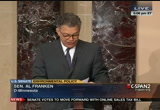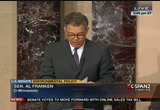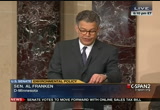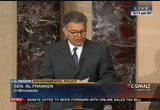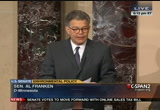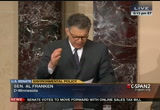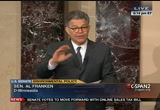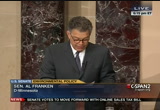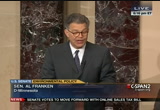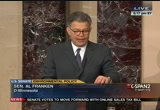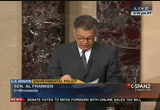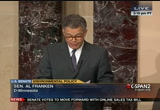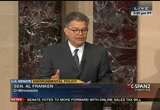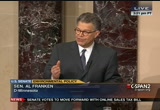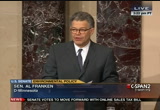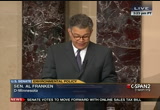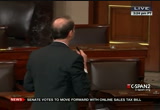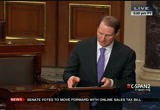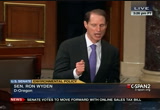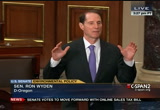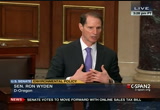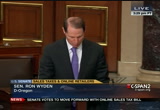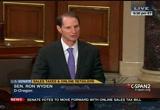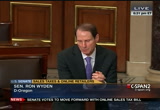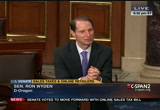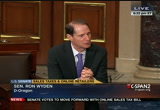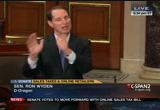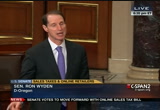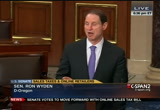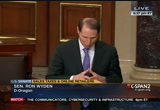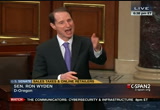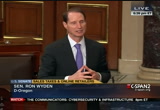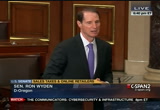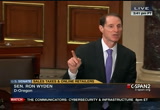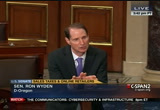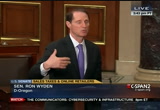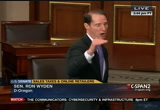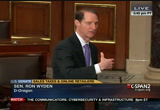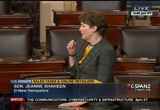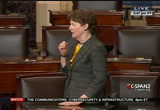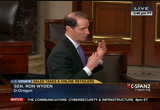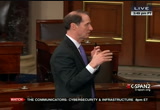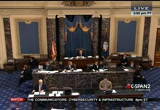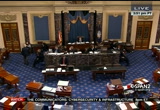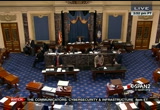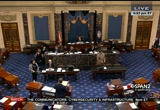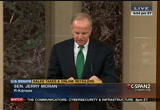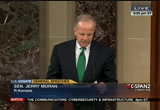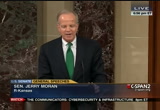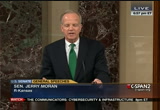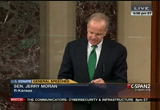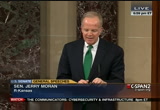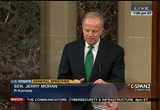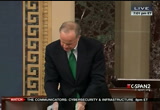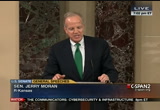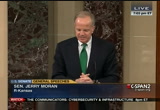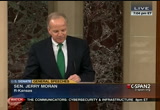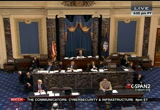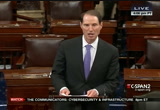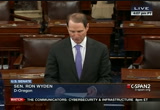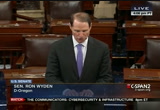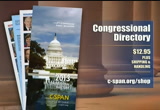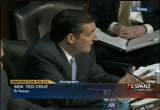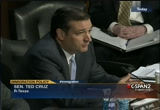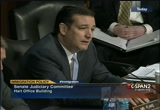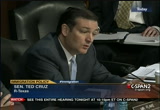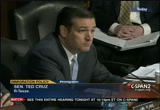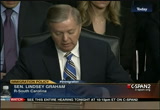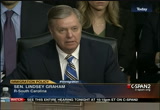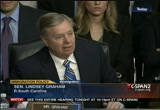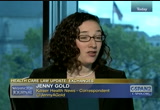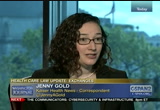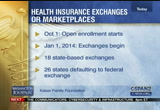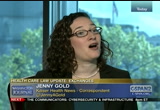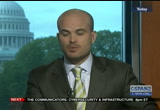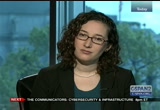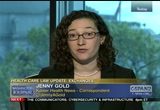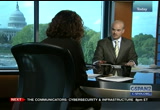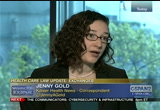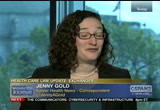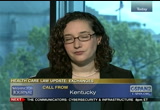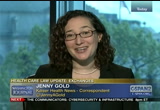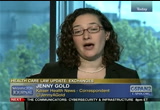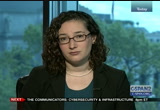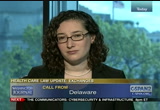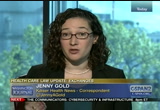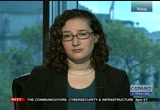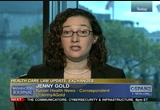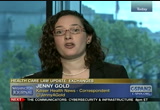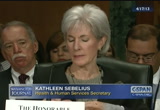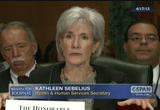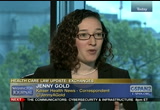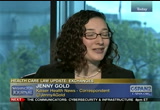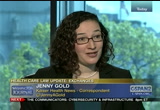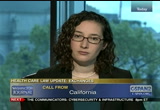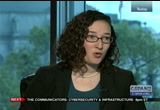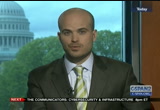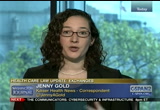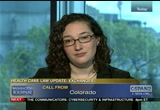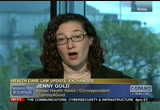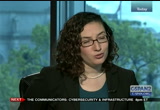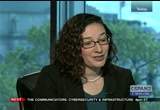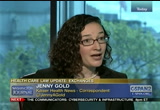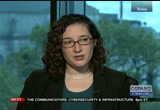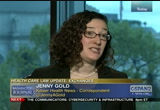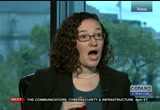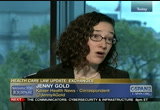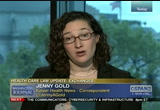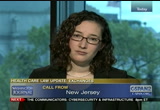tv U.S. Senate CSPAN April 22, 2013 5:00pm-8:00pm EDT
5:00 pm
collection act because it is going to make online businesses the tax collectors for the nation. and as the "wall street journal" pointed out in an editorial today called "the internet sales tax rush," it actually puts brick and mortar, puts the internet businesses at a disadvantage to brick and mortar businesses in terms of requiring -- making requirements on online businesses to collect taxes for transactions that the online businesses would not have to. and for a state like mine of new hampshire where we do not have a sales tax, this is also particularly onerous and really tramples on the decision that new hampshire has made to not have a sales tax. but most importantly, where we stand right now with the -- with the bill pending on the floor, you know, so many times there is so much around here that happens that does not go through regular
5:01 pm
order, and yet we have been talking on both sides of the aisle how important it is that when we have a major piece of legislation, which certainly this is, that we must go through regular order and that you just heard from the chairman of the finance committee saying that this is circumventing the committee process, that there has not been a markup of this piece of legislation and that there are many concerns that are being raised by online businesses across this country based on onerous requirements that this legislation will put on them to become the tax collectors for states around the nation, and many business groups are raising important issues and urging this body to go through regular process, including the financial services roundtable, security industry and financial markets association. technet said imposing a new internet sales tax regime is a tremendously complex issue that
5:02 pm
should be addressed through regular order, starting in the senate finance committee and done through a thorough and deliberative manner. it seems to me that when you have an issue that will impact a growing and robust area of our economy, that is online businesses that are selling to the nation where we have seen tremendous growth, that we owe it to the american people to have this go through regular order. and you know, i have heard the senate leader talk about regular order. i have heard the minority leader, senator mcconnell, talk about regular order, and here we are again not going through regular order. this should go to the finance committee. it should be thoroughly marked up in that committee. and i see senator hatch here. senator baucus and senator hatch both believe that this should go through the proper committee of jurisdiction so that we can address the concerns raised by so many about the bill and the way it is drafted. so with that, mr. president, i
5:03 pm
would urge my colleagues to vote against closure. this is not the right way to do business. this bill that has very important and negative implications on many businesses in this country and on a very important area of our economy should go through regular order to address concerns that have already been raised by many business groups, and so, mr. president, i would ask my colleagues to vote against closure today, and i know that i will yield the floor. i know the senator from tennessee is coming up now, and i know he, too, believes in regular order, and so i would hope he would for this bill, despite his support for it, ask it go through regular order. thank you, mr. president. the presiding officer: the senator from tennessee. mr. alexander: i thank the senator from new hampshire and the senator from illinois for allowing me to have five minutes. i do believe in regular order. i have been looking for for it for quite a while around here on
5:04 pm
this -- on this bill. but let me start with exactly what the point of this bill is. this is -- this bill is about two words. it's about states' rights. i say that as a former governor who cares a lot about states' rights. i see another former governor sitting in the chair up there. what this bill does is it allows the governor of tennessee and the legislature of tennessee to decide whether or not to require out of state salaries -- sellers in tennessee to do the same thing we require in-state sellers. in other words, if the national boot company has to collect the national sales tax and send it in to the state government when it sells a pair of boots, then an out-of-state catalog seller or an out-of-state online seller who sells boots in tennessee has
5:05 pm
to do the same thing. it's that simple. it's an 11-page bill. that's a rarity around here, an 11-page bill. it doesn't make any of these decisions for the states. it just says the states can make that decision for themselves. and with all respect to ourselves, mr. president, i trust the governor of tennessee, the legislators of tennessee to make tax decisions a lot more than i trust washington politicians to make. this has nothing to do with the federal tax code. it has zero to do with it. it has about as much to do with the federal tax code as the milk production bill. actually, milk production has more to do with the federal tax code. this is about what a state can decide for itself, and if somebody from ohio or illinois wants to sell in tennessee, they need to play by the same rules that everybody in tennessee has to play by or at least, which is all we're deciding, the governor and legislature of tennessee ought to be able to decide that.
5:06 pm
now, it's going to be done fairly. we have an equal protection clause in the constitution that says you can't treat an out-of-state seller in a different way than you do an in-state seller, but that's the first point. this is about states' rights. it's about the tenth amendment. it's about our saying yes, governor, yes, legislature, you don't have to play mother may i to the united states congress. make your own decisions about taxes. and if you decide that you want to treat one set of businesses differently than others and one set of taxpayers differently than others, well, then you have got a right to be wrong. that's your business. but if you decide that you want to collect taxes that are already owed, that are already owed, this is not a new tax, taxes that are already owed from everybody who owes the tax so that you can -- so that you can lower your tax raid for everybody, you're free to decide that. that was the argument that art
5:07 pm
laffer made in "the wall street journal" on last week. now, art laffer was president reagan's favorite economist. that's the point he made. states have the right to be right. he said this, states have the right to be wrong. but if tennessee or throw or any state can lower -- can collect taxes from everybody who owes it, it can lower the tax rate for everybody. that's why so many conservative leaders support this. art laffer, art cardenis, chairman of the american conservative union, governor mitch daniels, almost all the republican governors support this. but all we're deciding here in this two-page bill -- 11-page bill is two words -- do we respect states' rights to decide their own tax policy, do we respect states' rights as the tenth amendment suggests we do? as far as regular order, i wish the finance committee had reported a bill. this legislation was first introduced in some form in 2001. as the chairman of the finance committee said, he had a hearing
5:08 pm
on part of it last year. that was good. the commerce committee had a hearing on almost this identical 11-page bill last august. there have been repeated requests of the chairman of the finance committee to report the bill. he just has it. so ask what rule 14 is about. the majority leader said if the committee is not going to hold a hearing to report the bill after that amount of time, then let's put it on the floor, let's debate it, let's amend it. so it's been thoroughly considered. it's been before this body and the american people for a good bit of time. the bill that we would move to today is exactly the bill that was introduced on february 14 of this year, this 11 pages, exactly the bill. so it's been out there for everybody to see all that time. so i would urge the 75 senators who voted for this during the budget resolution to reaffirm their vote for states' rights. at least vote tonight to move ahead and let's debate it. let's put it on the floor. if people have amendments, if
5:09 pm
they have objections, let's bring them down here, let's debate them and let's vote on it. and if we don't, if we don't, as senator heitkamp has said, who knows -- the presiding officer: the senator's time has expired. mr. alexander: if i may use 30 more seconds. the presiding officer: without objection. mr. alexander: senator heitkamp will point out if we don't act, it will be one big mess, because instead of having a handful of jurisdictions where a seller can simply -- when you buy your ice cream over williams and sonoma and you put in your credit card and your zip code and automatically the tax is collected by the seller out of state and sent to the state, instead of that you will have thousands of jurisdictions to contend with. this simplifies the process, this is states' rights, this is an opportunity to debate a bill that's been around for more than a decade and that the country has been able to see for a couple of months. i urge our colleagues on both sides to take the conservative point of view and vote yes and move toward it. thank you. i yield the floor.
5:10 pm
the presiding officer: the senator from illinois. mr. durbin: mr. president, i want to thank my colleague from tennessee. this is truly a bipartisan effort on both sides of the issue, democrats and republicans see it differently. the distinguishing feature of those who oppose this is that so far the leading opponents are from states with no sales tax -- new hampshire, oregon, montana. one other state in america does not have a sales tax, delaware. they see it differently, they are supporting the bill. here's what it boils down to. if this bill passes as written, at the end of the day, a resident of montana still will not pay sales tax on any purchases they make in a store or on the internet. residents of oregon will not pay a sales tax on any purchase they make in an oregon store or over the internet. and the same holds true for new hampshire. they are held harmless from the impact of this. however, if an internet retailer in any of those no-sales taxes states wants to sell in maine,
5:11 pm
illinois, the terms of doing business under here are that they will collect the sales tax that is owed in that state. it is that simple. people have tried to make this more complicated. it's not. and they have also suggested that it's just going to be beyond, beyond anyone to calculate what the sales tax might be. that's just plain wrong. we're way beyond the quill pen and ledger days. we are now dealing with software easily available for a very small amount of money that can be given to any retailer to know exactly when durbin of bates avenue in springfield, illinois, 62704, buys a product, what sales tax should be collected. and the bill provides that each state has to provide the retailer free of charge with the basic software so that they can use this to collect the appropriate sales tax. trying to make this more
5:12 pm
complicated than it is. thanks to computers and thanks to software, it is not that complex. neither is the issue that are underlying this debate. the issue is this -- how in the world can you expect the bricks and march tar businesses of america to compete with internet competition when the bricks and mortar business has to collect sales tax and the internet competitor does not? in my state, that's an 8%, 9% or 10% advantage, and it's shifting more sales on to the internet and away from the local stores. i don't think that's fair. we're asking for a level playing field. a level playing field said if you want to sell to a consumer in illinois directly over the counter or over the internet, you collect the same sales tax. just that simple. if you don't want to, if your business in montana or oregon does not want to collect sales tax for sales in illinois, it is simple. you don't sell in illinois. it's their choice, their call. i think that is basic fairness.
5:13 pm
and look at the groups that are supporting this. i could sit here for the rest of my time and read all of the organizations supporting this, the obvious ones, retailers across america, the men and women with the stores, the small businesses whom we venerate in speeches all the time on the floor of the senate are begging us to do this. so they have a fighting chance against internet retailers. and they are also getting a lot of support from governors, from mayors, from labor unions. it's a diverse group, business and labor, and they believe it not only is fair but it will raise revenue that is badly needed in a lot of these local units of government. i might also say here that when you take a look at the impact of the current situation, you can understand why this is long overdue. mike enzi was on the floor earlier. he has been at this for 12 years, 12 years trying to change this. people say regular order, we ought to take a little more
5:14 pm
time. we can understand that our patience is wearing thin. this is wearing mine. i have only been at this a few years. on the budget resolution, we asked the members of the senate, what do you think about this issue, 75 members of the senate, 50 from the democratic side, 25 from the republican side said i think that's wrong -- 49 from the democratic side and 26 from the republican side said we favor going forward on this issue. that's the vote that we'll have in just a few minutes we'll raise, too. we should go forward on this. those that have constructive, germane amendments, bring them to the floor. let's have a conversation. let's get this issue done this week. let's make sure that we immediate the challenge that we have been given. i thank the senator from tennessee for making this as clear as i think any former governor can make it. if you want to do business in tennessee, play by tennessee rules by tennessee law. and if you don't, well then you don't have to do business in tennessee. it's just that simple and fair. in terms of imposing a new tax,
5:15 pm
this bill does not create one new tax. first, there are no federal taxes in here, none. and second, we don't even have the power to impose a new state tax, a state sales tax, nor would we try. no new taxes. simply a question of compliance and collecting the taxes already owed in the 46 states that currently have sales and use taxes. i urge my colleagues to come forward tonight at 5:30, vote for cloture on the motion to proceed. let us engage in this important debate. let us not put this off another day, another week, another month. let's bring this to a conclusion in the senate with a good, wholesome debate on a bipartisan basis, germane, relevant, constructive amendments that address some of the issues are welcome. bring them forward and let's not burn up the hours of the day and the hours of the week in quorum calls but let's get down to the business of the senate we were sent to do. i yield the floor.
5:16 pm
a senator: mr. president? the presiding officer: the senator from utah. mr. hatch: i want to say my thoughts and prayers go out to the good people in boston and other areas where they've had these tremendous horrific events and attacks and i hope and pray all of those whose lives were impacted by these tragic events will have a swift and peaceful recovery. in addition i want to commend the law enforcement agencies involved in the investigation that brought the huptd for the perpetrators to a successful end. over the last few months, i've come to the floor several times to discuss the need for the senate to return to regular order. if the last several years have taught us anything it's effort to force legislation through the senate without full and fair consideration tend to yield unsatisfactory -- unsaving -- unsatisfying results. complaints about the lack of bipartisanship have more or less become the norm around here and we hear about the desire for the so-called grand bargains. but, mr. president, bipartisan agreements don't just happen. i think we all agree grand
5:17 pm
bargains can't be made out of thin air. luckily, the senate already has a system in place for fostering these types of agreements. it's called regular order. yet today the senate will vote on cloture on the motion to proceed to the so-called marketplace fairness act. and in doing so the senate will once again abandon regular order in favor of the whims of the senate democratic leadership. this is a bill that fails -- falls under the jurisdiction of the senate finance committee. but the committee has not had a markup on the bill. instead, the marketplace fairness act is just the latest in the long line of bills brought before the full senate without due consideration in the committee of jurisdiction. mr. president, this has become far too common. i understand there are those who feel strongly about this legislation and i admire and respect the sponsors of the bill who have worked hard to address what they see as a major problem in our nation's tax policy. but that simply isn't enough to
5:18 pm
justify yet another adjudication of the -- or abdication of the committee process here in the senate. the senate is organized into various committees of jurisdiction so members are able to develop and utilize their own expertise on specific issues. when a piece of legislation goes through the committee process, it is thoroughly vetted and examined. this provides an opportunity to resolve technical issues and address various concerns before the bill is brought to the floor for a vote. regular order is not a process designed to protect the power of committee chairmen and ranking members. we have regular order and our committee structure so that we have an organized way of ensuring that our constituents are fully represented and to make sure that the legislation that we pass is technically sound. the legislation that will be voted on today is a perfect example of the importance of regular order. the marketplace fairness act is a bill that will have a significant impact on millions
5:19 pm
of consumers and businesses throughout the country, and clearly this is no trifling matter. most reasonable people would agree that a bill of this magnitude would benefit from full and fair committee consideration, including a markup with an open debate and an opportunity to vote on amendments before it's brought to the floor. however, being reasonable doesn't appear to be part of the equation on the floor today. i want to stress i'm not fundamentally opposed to this legislation. my goal is not to stop it at all costs. instead, i simply want to ensure it is fully vetted and examined and i know that if all sides were able to look at this a dispassionate way we might niendz ways of bringing all sides together. that's not going to happen the way it's being done now. therefore today's vote is at least much a vote on regular order as it is on the underlying bill. that said, i do have some specific concerns about the legislation as it is currently drafted. to begin with, the marketplace
5:20 pm
fairness act in its current form is a fairly short 11 pages long. this bill essentially provides two avenues for states to compel remote sellers or out-of-state businesses to collect and remit sales and use taxes. under the bill, a state may either meet specified minimum requirements or be a member state under the streamlined sales and use tax agreement as long as the minimum requirements are met under the agreement. the streamlined sales and use tax agreement is a good deal more complicated than the marketplace fairness act. for starters, at 203 pages, the agreement is about 18 times longer. since its adoption on november 12, 2002, the streamlined sales and use tax agreement has been amended 28 times most recently just last year p. it's an simple little problem here. the streamlined sales tax governing board has done excellent work in bringing
5:21 pm
states together to cooperatively and voluntarily address the issues of sales and use tax complexity and administration just to mention a few issues. according to the streamlined sales tax gonge board, 24 states have adopted the simplification measures in the agreement representing 31% of the population. the authors of the marketplace fairness act hope toably apply its measures to all 50 states and 100% of the population. however, the bill is comparatively short on details. for example, the streamlined tax agreement dines provisions on rules for the sourcing of sales, along with exclusions to those rules, in order to levy the appropriate sales tax you must determine the location and subject matter of the transaction. this level of detail is not present in the marketplace fairness act. it is unclear if the floor established on sourcing
5:22 pm
requirements under this bill is sufficient to protect consumers from unintended consequences. for example, i've received a letter from the american society of pension professionals and actuaries who are worried that this legislation -- quote -- "would allow states to impose a financial transaction tax that would apply to american workers' 401(k) contributions and other transactions within workers' accounts." another concern i have with the current version of the act is that it contains a presumption clause which could make it possible to expand the reach of sales taxes. while the streamlined tax agreement provides an avenue for the input putt of multiple states the states not subject to the agreement would under this bill be able to legislate knowing the federal government will compel nonresidents.
5:23 pm
i'm concerned with the potential transition costs that will come with this legislation. retailers have been operating in an environment where they have not been required to collect and remitt sales taxes for states where they do not have a physical presence. this legislation would change that almost in an instant. before we enact a new sales tax system we need to take into accounts the costs that will impose on businesses of all sizes and the difficulties those -- these companies will face as they adapt to the new regime. for example, there is the issue of vendor compensation. the streamlined sales and use tax agreement currently includes a provision giving states the opportunity to voluntarily compensate remote sellers -- quote -- "as a measure of good faith"-- unquote for registering to voluntarily collect and remit sales taxes into states where the seller has no physical presence. this is included in the agreement because under current
5:24 pm
law remote sellers are generally not required to collect and remit the sales tax and they incur a cost when doing so. the marketplace fairness act does not include any provision for compensation of remote sellers. i believe this is something we must take into account and examine even more thoroughly. i'm concerned about the small seller exemption in the bill which would exempt sellers with national remote sells of less than $1 million from the new requirements to collect and withhold sales taxes. this seems important but it is not without its problems. first of all, the cap on the exemption is not indexed to inflation. i think anyone who has observed any part of the roughly 50-year process where the alternative minimum tax has grown from a fairness measure targeting the rich 155 millionaires, i guess, to an ever-increasing burden on the middle class. they should under how inflation can radically distort policy
5:25 pm
outcomes over a period of time. in addition there are many month who argue the $1 million exemption may be too low. in my view these are concerns we need to fully consider before bringing the bill to the floor. finally, i want to point out that the bill does not include a provision for dispute resolution -- for a dispute resolution venue. ideally, the bill would give federal district courts exclusive jurisdiction in matters concerning the implementation of this legislation. policy changes with such far-reaching effects inevitably lead to unexpected issues and consequences. giving federal courts this jurors bike dicks would ensure greater uniformity and application of this legislation across the country. mr. president, these are just a few of the concerns i have regarding the marketplace fairness act. i don't believe that these are necessarily fundamental concerns but they are issues that need to be addressed. i am quite certain if given and
5:26 pm
opportunity the finance committee could address these issues without execs aably -- execs orably changing the underlying purpose of the bill. if we proceed as is, we will not have that opportunity. the senate simply cannot continue to operate this way. once again, we need to restore the deliberative traditions of the senate. that means a return to regular order. i know a number of my colleagues have expressed similar concerns about the need to restore the committee process in the senate. i hope they will join with me in voting no on cloture on the motion to proceed to the marketplace fairness act today. that doesn't necessarily determine how i'm going to vote in the final analysis of this but i sure as heck would like to approach it in a much more intelligent and legislatively profound way than we're doing here tonight. and, by the way, you can talk
5:27 pm
about -- about the fairness of this thing, but there are a lot of states that aren't quite convinced this as fair as those who are 0 supporting the bill actually claim. mr. president, i hope -- i hope that we can have a more deliberative time to examine these matters. the distinguished chairman of the committee has offered to have a hearing on the bill, to mark up the bill, and to consider it in a regular order aretch -- regular order approach as soon as we get back in this next recess and, frankly,, i think that's a pretty good offer and one we ought to honor if we honor our committee structure in the united states senate. mr. president, i yield the floor and suggest the absence of a quorum. the presiding officer: the senator from tennessee. mr. alexander: i ask consent to
5:28 pm
include in the record an op-ed from "the wall street journal" by arthur blaffer entitled internet sales stimulate growth. mr. laffer is a distinguished economy, president reagan's favorite economist. he makes the argument many conservatives, governors are making, give us the authority to make these decisions for ourselves. we'll collect taxes from everybody who already owe the taxes by requiring sellers to collect the taxes whether they're in state or out of state, and then we'll lower the tax rate. mr. laffer says are fairness legislation that collects taxes from everyone who owes it and then lowers the tax rate is better for economic growth which is something our country desperately needs. and i would like to also ask consent to include comments supporting specifically the legislation from al cardenas,
5:29 pm
chairman of the consumers union, former governor mitch daniels of indiana. the presiding officer: without objection. a senator: mr. president? the presiding officer: the senator from montana. mr. baucus: mr. president, what's the parliamentary situation? the presiding officer: we are in morning business for up with more minute. then morning business will be closed and we'll proceed to the motion under the agreement. mr. baucus: i'll take that one minute, please. mr. president, this is pretty simple. this legislation is only recently introduced, never been vetted, this bill -- others have, not this bill. fraught with all kinds of problems, some of them already enumerated on the floor, many unintended circumstances. the only right thing to do is to -- for the committee to take it up and as chairman of the committee i've made the promise many times. we've already had hearings but we'll have a markup on this
5:30 pm
bill, in the next work period, and markup means there will be a vote and i'm standing here ready to abide by the vote. i submit right now that a majority of the members of the finance committee probably -- they may be inclined to support this thing, i don't know. but that's the process here. that's what we should be doing. not just ramming this thing through with so complex, so many unintended consequences. many of the consequences have been enumerated here and not addressed but could be addressed and would be addressed in the -- in the proper committee forum. mr. president, i yield the floor. the presiding officer: morning business is closed. under the previous order, the senate will resume consideration of the motion to proceed to s. 743, which the clerk will report. the clerk: motion to proceed to calendar number 41, s. 743, a bill to restore states' sovereign rights to enforce state and local sales and use tax laws and for other purposes. the presiding officer: the clerk will report the motion to invoke
5:31 pm
cloture. the clerk: cloture motion. we, the undersigned senators, in accordance with the provisions of rule 23 of the standing rules of the senate, hereby move to bring to a close the debate on the motion to proceed to calendar number 41, s. 743, to restore states' sovereign rights to enforce state and local sales and use tax laws, and for other purposes. signed by 17 senators. the presiding officer: by unanimous consent, the mandatory quorum call has been waived. the question is: is it the sense of the senate that debate on the motion to proceed to s. 743, a bill to restore states' srch st' sovereign rights, to enforce state sales and local use taxes and for other purposes shall be brought to a close? the yeas and nays are mandatory under the rule. the clerk will call the roll. vote:
5:55 pm
5:56 pm
mr. reid: mr. president? the presiding officer: the majority leader. mr. reid: i ask unanimous consent that all time during adjournment, recess, and morning business -- ferraro the senate will be in order. mr. reid: clowns count postcloture on the notion proceed to s. 743. the presiding officer: is there objection? without objection. mr. reid: i asking senator durbin as the floor manager for the consideration of s. 743. i note the absence of a earl quo. the presiding officer: the clerk will call the roll. quorum call: a senator: mr. president? the presiding officer: the senator from minnesota. mr. franken: heard the senator from colorado. do you have -- my remarks are about 25 minutes. so is the senator from
5:57 pm
colorado's significantly shorter? dull dull mr. president? the presiding officer: the senator from colorado. mr. udall: i have three or four minutes of remarks. mr. franken: i would yield to my colleague. the presiding officer: the senator from colorado. mr. udall: thank you. i want to tank my colleague from minnesota for his forebearance. the presiding officer: the senate will be in order. the senator from colorado. mr. udall: i rise today in support of our local small businesses and retailers across colorado. the presiding officer: the senate is in a quorum call. mr. udall: i would ask that the quorum call be lifted. the presiding officer: without objection. mr. udall: i rise today in support of our local small businesses and retailers across colorado and i'd like to think across our great country. senator durbin and senator enzi have introduced a bipartisan bill, the marketplace fairness act, of which i am a cosponsor. and it would level the playing field for businesses locate in colorado by requiring
5:58 pm
out-of-state state online sellers to collect and remit the same local and state sales taxes that they have to pay. it just makes common sense, which is why a similar amendment during the budget debate a few weeks ago, which i also cosponsored, passed by a bipartisan vote of e 75-24678 te marketplace fairness act is about achieving equitable treatment for all sales so that businesses will a physical presence in colorado, employing colorado workers, and anything n our mustn'ts are not a a competitive disadvantage with out-of-state businesses that sell products online. mr. president, online marketplaces have created great companies in innovative ways of doing business. but federal laws fail to keep pace with the -- the presiding officer: the senate will be in order. the senator from colorado. mr. udall: thank you, mr. president. so again, we've had a lost innovation in the online space.
5:59 pm
but federal laws failed to keep up with the pace of online sales. back when trading posts and markets were the most prevalent place for sea, you didn't have to worry about out-of-state sales. because of these online sales, we now have two equitable forms of treatment in the marketplace, where local brick and mortar sellers have to pay sales taxes and where out-of-state retailers get to avoid collecting any sales taxes at all. and this is -- it has created a disincentive to shop and support our small local businesses. it has been said that for at least a decade that fixing this inequity is too difficult or will burden certain online retailers or consumers. however it should be noted that this legislation requires states to simplify sales tax laws ply
6:00 pm
to these out-of-state sales mission to providing software free of charge to sellers in order to make the tax of remitting this revenue as pain-free as possible. my state of colorado is considering legislation this year to contomorrow to the rules set out in this bill. the version that we are going to consider of the phafrbgt place fairness -- marketplace fairness act has been negotiated by members of both political parties and it is a testament of what we can do to work together to benefit our country and our economy . not only will this legislation help level the playing field for mom and pop shops across our state and our country, it will help restore a lost revenue base for local governments that has slowly been eroded with the expansion of online out-of-state sales . most americans know that these commonsense fair taxes support our schools, police and fire departments and other critical
6:01 pm
local services . at the very least, i think we can all agree that we do not want to penalize main street retailers for creating jobs in colorado communities, which is why this bipartisan bill is so important . mr. president, i look forward to voting for the marketplace fairness act and encourage all of my colleagues to do the same i want to acknowledge my colleague from minnesota for yielding me the time . mr. president, i yield the floor . the presiding officer: the senator from minnesota . mr. franken: i thank the senator from colorado for his message . i too am a cosponsor of the marketplace fairness act . i'm very glad that we're -- that we achieved cloture on it . mr. durbin: would the senator from minnesota yield for a moment? mr. franken: absolutely . mr. durbin: i believe the senator from oregon would like to make a very brief statement for the record .
6:02 pm
mr. franken: sure . okay . the presiding officer: the senator from oregon . a senator: the vote was closed as i was coming in the door . mr. merkley: had i been here i would have voted against cloture i want that to be a part of the record . thank you, mr. president . mr. franken: mr. president, i ask to speak as if in morning business for 25 minutes . the presiding officer: without objection . mr. franken: i ask unanimous consent that anna henderson, a fellow of my staff, have privileges on the floor during today's session . the presiding officer: without objection . mr. franken: thank you . mr. president, i rise today to talk about climate change, but i first do want to say how pleased i am that we just got cloture to move to debate on the marketplace fairness act . i'm a strong supporter of the legislation, as i said; i'm a
6:03 pm
cosponsor and look forward to the upcoming debate on this, and i plan to speak on this legislation -- the presiding officer: the senate will come to order . mr. franken: i plan to speak on this legislation further tomorrow . but now i'd like to turn to talk about climate change, more specifically, i rise to suggest that we in this, the body talk more about climate change so that we can agree on taking action to address it . we need to address the environmental impacts that are -- that we are currently facing and the future impacts that will only become exponentially worse if we fail to act . 2012 was the hottest year on record in the continental united states . in fact, it beat the previous record by a full degree . now to give you some idea about how remarkable a full degree of
6:04 pm
warming in one year is, scientists tell us since the last ice age, 20,000 years ago, the earth has warmed only 16 degrees at the most . since we began actually measuring temperatures in the continental united states and recording them, 117 years ago, the variance between the coldest year and the warmest year has only been 4.2 degrees . so for the temperature to jump a full degree in one year is not just remarkable, it's alarming . often when people consider the harmful consequences of climate change and its costs, they're talking about the future . but make no mistake, climate change is already costing the united states serious money .
6:05 pm
2012 was a year when an historic drought caused more than 70% of u.s. counties to be declared disaster areas . agriculture secretary tom vilsack estimated the drought's impact on the ag sector to be around $50 billion to $60 billion . that cost gets passed on to every american . the drought destroyed or damaged major crops across this country making corn and soybeans more expensive, increasing animal feed costs and so americans are paying more for meats and other animal-based products . the 2012 drought dramatically lowered water levels on the mississippi river, seriously interfering with our ability to transport our agricultural goods to market to compete with those from other countries . so that barges don't run
6:06 pm
aground, shippers send them down the mississippi this last few months half full, say with soybeans, making our beans less competitive with brazilian beans more and more of my conversations with minnesota minnesota soybean growers who export over a third of their crop focus on this issue . climate change is exacerbating our nation's wildfires, and that is costing us serious money . when forest service chief tom tidwell testified before the senate energy committee, i asked him about the link between forest fires and climate change he told us that throughout the country we're seeing longer fire seasons on average by more than 30 days . whaoeuld fires are also larger and -- wildfires are also larger and more intense . i asked chief tidwell weather
6:07 pm
scientists at the forest service thought climate change was increasing the size and intensity of wildfires and extending their season, and without hesitation he said yes . the forest service is spending more and more of its budget fighting wildfires, half of its budget . longer fire seasons and larger, more intense fires are just going to eat up more of that budget . not only is climate change worsening our forest fires, it's also exacerbating other problems plaguing our forest . that includes the very serious bark beetle problem . it is normally kept in check because cold winters at high altitude kills its larva . the presiding officer: the senate is not in order . the senator from minnesota . mr. franken: i was talking about the bark beetles at high
6:08 pm
altitudes . their lava used to freeze, but now because of climate change that's not happening . as winters get warmer and at higher altitudes, the bark beetle is surviving . that means they're destroying more forests . in some colorado forests, scientists have shown that because of warmer weather, mountain climb beetles have gone from reproducing once a year to twice a year . in a little over a decade, mr. president, this mountain pine beetle has killed more than 70,000 square miles worth of trees . that's an area equivalent to the entire state of washington . of course, mr. president, we can't talk about climate change without talking about sea level rise . i serve on the committee on energy and natural resources . several months ago we had a hearing on sea level rise, and
6:09 pm
we heard testimony about how rising sea levels increasing the size of flood zones and increasing damage that occurs from storm surges . one of the witnesses told us that just a few extra inches of sea level could result in a storm surge that could flood the new york city subway system . it sounded like something out of science fiction, yet a little over six months later that's exactly what happened . that's exactly what happened when hurricane sandy hit new york city and flooded the subways . and my colleagues do not need to be reminded of the cost of hurricane sandy . it's costing taxpayers a staggering $60 billion . unfortunately, mr. president, only one of my colleagues from the other side of the aisle, the ranking member, senator
6:10 pm
murkowski, attended that hearing this has been pretty much the case whenever we have a hearing that even tangentially relates to climate change . a number of my colleagues in congress don't believe that human activities contribute to climate change . many others i suspect don't talk about climate change because addressing it requires making some difficult choices . but let's be clear about this, climate change is already costing us . and if we don't act now, it will worsen dramatically and be far more costly . the defense department has studied potential threats to national security posed by climate change . d.o.d.'s 2010 quad perennial defense review -- quadrennial defense review states climate change may act as an accelerant
6:11 pm
for instability and that in turn would place burdens on civilian institutions and militaries around the world . the top commander in the pacific, admiral samuel locklear, said the biggest long-term security challenge in the pacific is the climate change . as the pacific commander, he understands the impact that sea level rise and extreme weather events can have on our military resources and on civilian populations in the pacific . my constituents in minnesota also understand that the threat of climate change . that's why recently nearly 400 people gathered at a local lutheran charge in wilmer, minnesota, to talk about climate change . wilmer is not a big city, so when this many people gather in one place, you know it's a big deal . they're concerned about climate change and the marked increase in severe weather occurrences .
6:12 pm
but when they look to washington, they see a disconnect . they see a disconnect between what the country is experiencing and what washington is doing about it . or rather, what washington is not doing . outside of washington and not just in minnesota, things are different . in fact, many respected republican leaders outside of washington understand the importance of addressing climate change . in the aftermath of hurricane sandy, for example, republican governor chris christie of new jersey acknowledged that climate change is a problem and that human activities are playing a roefplt -- role . former california governor arnold schwarzenegger also a republican launched an organization to fight climate change . former utah governor and republican presidential candidate jon huntsman noted whenever a party takes a
6:13 pm
position that runs counter to 98 out of every 100 scientists, that party has a problem . governor huntsman is right . let me illustrate with an analogy . say you went to a doctor who told you, you know, you better start eating more sensibly and start exercising because you're just tremendously overweight and i see in your file here that your father died of a heart attack at an early age . you've really got to go on a diet and start working out . and you say, you know what, i'd like a second opinion . so you go to a second doctor, and he examines you, or she examines you, saying, okay, look, you have a family history of heart disease . your father died of a heart attack at 40 . you weigh over 300 pounds . your cholesterol is out of
6:14 pm
control . your blood pressure is through the roof . it would just be irresponsible of me not to immediately send you to the mayo clinic to this place i know . you've got to go there . then you say, thanks, doctor, but i'd really like a third opinion . and the third doctor says, wow, this is a problem . you know, looking at your family history and looking at you and your tests, i'm amazed you're still alive . you've got to do something about this . and you say, you know, i'd really like a fourth opinion . and this keeps going on, and it takes months . finally you get to the 50th doctor, and the 50th doctor examines you and says, boy, it's a good thing you came to me, because all this diet and exercise would have been a complete waste . you're doing just fine . and those other doctors, well, they're in the pockets of the fresh fruit and vegetable people
6:15 pm
enjoy life, eat as much as you want, and watch a lot of tv . and then you learn that that doctor was paid his salary by the makers of cheetos, which don't get me wrong, cheetos are a delicious snack which can and should be eaten in moderation . ff 98 out of 100 doctors tell me i have got a problem, i should take their advice. and if those two other doctors get paid by big snack food like certain climate deniers get paid by big coal, i shouldn't take their advice. well, 98 out of 100 climate scientists are telling us that we have got a problem. so governor huntsman is right,
6:16 pm
and outside of washington, many people get this. even some of the very companies that previously funded anticlimate change -- anticlimate change efforts have turned the page on this issue. exxonmobil used to fund the heartland institute, one of the leading climate change denial organizations, but if you go now to exxonmobil's web site, if you go there today, it states, and i quote -- "rising greenhouse gas emissions pose significant risk to society and ecosystems." that's exxonmobil. shell oil states on its web site -- quote -- "co2 emissions must be reduced to avoid serious climate change." shell oil. so even the major oil and gas companies have begun to acknowledge that climate change is real.
6:17 pm
i would respectfully suggest that my colleagues on the other side of the aisle here in congress also need to engage in a serious conversation on climate change. in a time when americans are dealing with record droughts and devastating hurricanes, the senate cannot ignore -- cannot afford to simply ignore climate change. we need to talk about it. just as democratic and republican leaders outside of washington are talking about it. and ultimately, we have to come together to start addressing climate change before its damage and cost to society get out of control. i do not pretend that this is going to be easy, mr. president. some people will point out that climate change is a global problem, and it is and we can't
6:18 pm
solve it alone. we can't. they are right. emissions in the developing world are on the rise. china now sur surpasses the u.s. in total greenhouse emissions. not per capita. we're still ahead on that. but china is also making major investment in renewable energy. according to the united nations environmental program, in 2011, china led the world in renewable energy investments with nearly 1/5 of the global total. that's in spite of the fact that china's g.d.p. in 2011 was half of our g.d.p. if we are going to leave the clean -- lead the clean energy race and create good-paying jobs for americans, we, we have to invest in our renewable energy infrastructure. last year, the senate energy committee heard testimony regarding a report from the
6:19 pm
american energy innovation council's report entitled catalyzing ingenuity, the report authored by norman augustine, microsoft founder bill gates and other business leaders states, and i quote -- "the country has yet to embark on a clean energy innovation program commensurate with the scale of the national priorities that are at stake. in fact, rather than improve the country's energy innovation program and invest in strategic national interests, the current political environment is creating strong pressure to pull back from such efforts." unquote. this is really important, and i encourage my colleagues, especially those who oppose federal funding for clean energy, to read this report, because what people often forget is that this is nothing new.
6:20 pm
government has always supported strategic energy priorities. as mr. augustine noted in his testimony, commercial nuclear power was the result of government investments in naval reactors. and do you know why natural gas is transforming our energy sector today? it's because of years of federal support to develop hydrofracking technology. the eastern gas shales project was an initiative the federal government began back in 1976 before hydrofracking was a mature industry. the project set up and funded dozens of pilot demonstration projects with universities and private gas companies that tested drilling and fracturing methods. this investment by the federal government was instrumental in the development of the commercial extraction of natural gas from shale.
6:21 pm
in fact, microseismic imaging, a critical tool used in fracking, was originally developed by sandia national laboratory, a federal energy laboratory. the industry was also supported through tax breaks and subsidies. in fact, mitchell energy vice president dan stewart said in an interview that mitchell energy's first horizontal well was subsidized by the federal government. mr. mitchell said, and i quote -- "d.o.e., that's the department of energy, d.o.e. started it and other people took the ball and ran with it. you cannot diminish d.o.e.'s involvement." so the basis of the natural gas revolution that is helping make america more energy independent can be traced -- can be traced back to federal support. and in the same way we have to support the renewable energy sector now.
6:22 pm
we have to be the ones, our country, the united states, americans, we have to be the ones who will sell this transformative and environmentally friendly technology to other nations. we must do that. so we need to start by having a conversation about climate change. it would be irresponsible to avoid the issue just because it's uncomfortable to talk about. the stakes are too high and we would be shirking our responsibility to our constituents, to our children, to our grandchildren and to posterity. the discussion is not going to be easy because there are going to be painful tradeoffs, and i certainly don't have all the answers, but i do know we have to have the conversation. we cannot leave this issue to future generations. i have a grandchild on the way, my first.
6:23 pm
i don't want to look back and tell him that when his grandfather was in a position to do something about climate change, he chose not to because it involved some politically difficult choices. i don't want to tell him that we compromised our moral integrity for political expediency. mr. president, we all have constituents who care about this issue. when i go back to wilmer, minnesota, i want to tell my constituents who met in that church and talked about climate change that we -- well, that we've heard them, and i want to tell them that we are working together across the aisle to talk about and to address one of the biggest and most difficult problems that we face. so i invite my colleagues to join in this endeavor and make dealing with climate change a
6:24 pm
bipartisan issue. we really owe it to the nation and to future generations. thank you, mr. president, and i yield the floor. a senator: mr. president? the presiding officer: the senator from oregon. mr. wyden: mr. president, before he leaves the floor, let me just commend my colleague from minnesota for making so many thoughtful points in this effort to deal with climate change having just come back from oregon with a whole host of meetings, of course, in connection with earth day, you are spot on in talking about the enormity of the problem. it is very clear that the planet is getting warmer, the fires are getting more serious and catastrophic, the storms increasingly brutal, and it's very clear that now democrats and republicans have to come together around this issue. you and i serve together on the energy and natural resources committee.
6:25 pm
that's going to be priority business for us, and your thoughtful remarks today are yet another effort it seems to me in terms of trying to bring people together. the focus of your remarks has not been to say it's this person's fault or that person's fault. it's about how democrats and republicans will have to come together, and i want to commend my colleague for his thoughtful speech and the good fortune that we have that you chair an important subcommittee there on energy and natural resources where you're going to be able to focus on these issues at length. mr. franken: thank you, mr. president. mr. wyden: mr. president, i would ask unanimous consent to speak as if in morning business for up to a half an hour. the presiding officer: without objection. mr. wyden: mr. president, the senate has now moved to the marketplace fairness act. i say that frankly a little dubiously because i think it really ought to be called the shop canada or shop mexico act because it really is going to make it attractive for
6:26 pm
businesses located in the united states to set up shop overseas because the coercion that is applied in the united states will not affect foreign retailers. but what i want to do tonight is speak for just a brief period of time because we're going to have an opportunity throughout the week to discuss this in hopes that the points that i highlight tonight will help start a bipartisan effort to try to fix what i think are the most serious problems with the marketplace fairness act. and the essence of my concern, mr. president, is coercion and discrimination are not what america is all about, but those are the fundamental principles of the marketplace fairness act,
6:27 pm
and what i would like to do is be very specific with respect to how this coercion and discrimination, particularly against some of the most innovative forces in the american economy is going to take its toll. first of all, with respect to coercion, this is legislation that enables one state to impose the enforcement of its laws on 49 other states and the territories without the approval of such states and territories. now, let me repeat that. it is coercion. it can be forced on these other states against their will and in effect under the marketplace
6:28 pm
fairness act, businesses can be audited by a myriad of out-of-state tax collectors and be forced to defend themselves in out-of-state court. so a vote for the marketplace fairness act without efforts to try at least to promote some element of voluntariness in all this, a vote for the marketplace fairness act is a vote to subject a senator's home state internet companies to the will and whim of tax collectors in state courts around the country. so that in essence, mr. president, is the coercion aspect of this legislation, and i have suggested to senators that at a minimum, this effort should -- this legislation should be altered to allow for voluntary compacts. congress would say that states could voluntarily take these steps with respect to interstate
6:29 pm
tax collection rather than being required to do it, and i have heard my colleagues say well, perhaps that would make one state a haven with respect to internet sales. well, the reality is that states' rights are about states' rights, and one state may choose to look to insent one particular type -- incent one particular type of business or another, but this is ultimately a state decision. so if you are in fact a supporter of states' rights, why would you oppose something that allows a state to voluntarily choose what course it wants to promote with respect to the collection of online taxes? that's not what this bill is all about. it is not voluntary. it is coercive. and that's why in my view it
6:30 pm
undermines what i think the principles of our country are all about. our country is not about coercion, it's not about discrimination. that's what the bill is regrettably all about. now, let me outline the second point, mr. president, with respect to how the marketplace fairness act discriminates against internet companies. the marketplace fairness act relies on internet sellers to determine the address of where consumers are located in order to generate a approximation of where goods or services sold by an online retailer will be consumed. there is no similar requirement with respect to brick and mortar businesses. no similar requirement with respect to brick and mortar businesses, even though consumers often travel across state lines in order to purchase goods and services that may be unavailable to them in their
6:31 pm
home jurisdiction or available at lower sales or use tax rates. the marketplace fairness act does not require brick and mortar firms to obtain and use consumer information to determine where a good or service may be consumed. why should the federal government require internet companies to collect and remit sales and use taxes on behalf of consumers but not impose any such burden on brick and mortar firms that are providing goods and services to out-of-state consumers? so the irony of this, mr. president, is really about 15 years ago, and it has been really particularly satisfying to me in terms of our service in the senate, as we began to look at policies that would allow innovation and technology to grow -- and i'll talk a little bit about how some of those
6:32 pm
policies really led to the first investments in social media -- we established two principles. we established two principles with respect to technology policy. one, we said let's ensure that there is no discrimination. what goes on off-line and what goes on online should be parallel so that we can encourage both parts of the american economy and that principle, mr. president, has made a lot of sense. in fact, it's led to a great many stores, i'm sure at home in indiana for the president of the senate, it's meant there's a lot of stores with bricks and clicks. and, in fact, they look to try and have a vigorous preps in both states because the two are mutually reinforcing. and to do that you've got to ensure that there is a policy of nondiscrimination. and what i have done is outlined
6:33 pm
very specifically about how the marketplace fairness act moves away from that principle of nondiscrimination by giving in many jurisdictions these brick and mortar retailers a leg up. what i am in favor of is continuing that policy which has made sense for 15 years. and then we talked about doing no harm and ensuring that especially we promoted voluntary approaches. voluntary approaches. mr. president, i think it was before you were in the congress, but one of the things that i was especially proud of that's helped to generate investment in the social media is back when i came to the senate there was great concern about sensorship on line -- and of okay, all of us were horrified by some of the smut
6:34 pm
and pornography that was coming available on line, all over the web, and so a big debate was held. and there were essentially two approaches. one was to set up a big censorship effort to say that, for example, if somebody posted some of this horrible pornography on a web site or a blog, the web site would be held secondarily liable for this material posted on the site. and a lot of us said no way, the net is going to be able to grow, if web sites and blogs are held liable for something posted on their site they probably aren't going to know anything about because there are, of course, thousands and thousands of postings, millions in the case of some of the big sites. so working with a very conservative republican in the
6:35 pm
house, congressman cox, we wrote an alternative approach which encouraged voluntary approaches with respect to dealing with the societal problem and very serious problem with respect to pornography and back then the congress didn't know how to deal with these issues, so both approaches, both the censorship approach and the voluntary approach to help parents filter out the smut actually got into the law and went to the supreme court. and the supreme court struck down the censorship approach and upheld the voluntary bipartisan approach that congressman cox and i put together. and today, when you talk to people in the social media, they will tell you that voluntary approach was to a great extent what encouraged the first investments in social media. and people in social media will say nobody would have invested
6:36 pm
in the future of facebooks and twitters and the like if they thought that the social media site, the web sites and the like, were going to be held secondarily liable for something that was posted. and that voluntary approach which did so much to boost our economy is being rejected in the marketplace fairness act as it's written, because this bill goes to a coercive approach, as i said, that would outline the ability for one state to impose the enforcement of its laws on 49 other states and territories without the approval of those states and territories. so i bring this up tonight, mr. president, because i'm very hopeful that as this debate goes forward, as this debate is considered further, that at main, the -- at a minimum, the sponsors of the legislation
6:37 pm
and all of us here can count and look at vote totals. i hope that they will see that allowing for voluntary compacts, that's really what states' rights are all about, number one, and it is that voluntary approach, mr. president, that has made such a difference in encouraging the innovation and growth of the internet and technology. now, one other point that i'd like to mention tonight, mr. president, and that is what this bill does with respect to america's ability to compete in a global economy. this is in effect an unprecedented approach that would apply local laws to the global medium that is the internet. and, for example, i just came
6:38 pm
back, flew about 6,000 miles over the last few days from meeting with constituents at home and i was in southern oregon until the middle of the day, you know, yesterday, and they've got a big e-commerce effort going, and a wonderful company called fire mountain gems in grants pass, oregon. hundreds of employees, very exciting online business. their big competitor there in grants pass, oregon, which is a town that has been hard hit economically, we're working hard on their forestry issues, trying to get the harvest up which is something i'm working on as chairman of the energy and natural nal resources committee, had a good chance to talk about resources policy with the president of the senate, and one of the things that they very much want to do in grants pass is find as many good-paying
6:39 pm
jobs as they can given the fact that the economy is hurting in rural areas. so as i try to boost the harvest up in grants pass, you know, oregon and get people back to work in the woods, i'm obviously looking for other areas where businesses could grow. this legislation as written will deal a significant body blow to a business like the one that i know about in grants pass, oregon's ability to grow. and here's why. the legislation, mr. president, doesn't apply to foreign retailers. the competition for fire mountain gem is certainly overseas, with a host of companies in this space, and it also has huge implications for the northern border and the southern border of our country, because so many of the promising
6:40 pm
businesses in those communities are going to say some themselves we are patriotic americans, we deeply believe in our country, and our values, but how are we going to compete? how are we going to try to figure out a way to wade through more than 9,000 taxing, you know, jurisdictions and wouldn't it be more sensible to just move a half an hour across the border and not have to go through any of this? i just don't think this works as it relates to the global economy. and maybe this bill ought to be called the shock -- shop china or shop mexico or shop canada bill. but whatever you call it, mr. president, it seeks to apply local laws to a global medium. and that in my view defies
6:41 pm
common sense, and, by the way, it, too, has been a principle that has been rejected in debates about tech policy over the years. so i hope senators are going to be open to working with the bipartisan, you know, group, there are a host of senators on both sides of the aisle who care about these issues, to try to take some of the principles that have been central to the growth of innovation, online businesses particularly as it relates to new apps and new technologies, take some of the principles that have worked for the last few years, build them into this legislation rather than repudiate the principles of voluntariness and
6:42 pm
nondiscrimination that have been so key, as i've outlined here tonight, mr. president, to investment in the social, you know, media, to encouraging innovation through nondiscriminatory tax policies, to new innovations that we began to bring into the policy arena like digital signature, same thing, great concern about, you know, whether this was equitable, whether it would work. but after hearings and a thoughtful analysis, a group of us wrote that law as well. so whether it was regulation, whether it was taxes, whether it was innovation like digital signatures, the four or five laws over the last 15 years, mr. president, that have paid off for technology and innovation and small business, the basic principles behind those laws are being repudiated in this bill.
6:43 pm
and i think that will be injurious to the country and my hope is that as we go forward, we can take some of those principles that have been key to growth in the technology sector and start building them into this discussion with respect to collection of online sales tax. by the way, mr. president, for more than a decade this has been a topic, and i and others have said we're very open to any and all approaches to collect taxes owed, and particularly ones that don't amount to what looks like bureaucratic water torture associated with the collection process. and i think senators are underestimating how difficult this will be, and i particularly cite the proposition that if it was so
6:44 pm
easy, mr. president, it would have been done some time ago, and, by the way, it would have been done with voluntary actions through many of these taxing jurisdictions rather than the coercive approach thaz advance -- that is advanced in this legislation. i see my friend from new hampshire, you know, here and i was particularly struck, i would say to my colleague, about how the principles i'm talking about today, coercion and nondiscrimination, apply in my colleague's state, you know, as well. because her state like so many others would face the prospect where online retailers would have one set of burdensome rules that wouldn't apply to a whole host of other businesses. it brings back the principle of
6:45 pm
discrimination that we rejected years and years ago. so, mr. president, i'm sure my time is close to expiring, but having heard the senator from new hampshire speak eloquently on these issues, i think i want to -- i yield the floor and give her the time and look forward to her remarks. because when i came to the floor, i s -- i said the key to successful tech legislation for the last 15 years has been two principles: a voluntary approach rather than a coercive approach, and nondiscrimination rather than discrimination. and the senator from new hampshire and i are from states where this bill brings those policies, coercion and discrimination, back in very stark terms that will be injurious to the citizens that we represent and i think harm
6:46 pm
the cause of innovation across the country. so i'm going to yield the floor, mr. president, and thank the senator from new hampshire for all her contributions. we've talked about this on a number of occasions and i'm looking forward to her remarks. mr. president, i yield the floor. a senator: mr. president? the presiding officer: the senator from new hampshire. mrs. shaheen: mr. president, i couldn't say it any more eloquently than my friend from oregon, who small businesses are facing the same kind of discrimination that our small businesses in new hampshire are facing. and i came here straight from the airport. my flight was delayed so i wasn't here to vote "no" on this legislation that i think really has not been thought through carefully, because, as you point out, it is going to affect innovation and the ability to use the internet in the way that i think most of us envision it should be used, and it's going
6:47 pm
to set up a whole new set of rules that are very difficult for our businesses in new hampshire and oregon to comply with. and i think it's not the best way for us to go about taxation and doing it in a fair way. and, sadly, we're going to see as the result of this legislation, if it passes, as you pointed out so well, a whole different set of rules for one set of businesses than for another and that just isn't right. so i -- i plan to come down to the floor and speak at greater length about this tomorrow but i wanted to come here this afternoon when i heard you were speaking, as i came from the airport, just to join you in opposition to the legislation and to point out that i certainly would have voted "no" and intend to continue to do everything i can to try and address what i think is a very unfair way to deal with taxation.
6:48 pm
mr. wyden: mr. president? the presiding officer: the senator from oregon. mr. wyden: before she yields -- before she leaves the floor, i just want to thank the senator from new hampshire for her contribution. obviously the vote this afternoon didn't go our way. my hope is that as you and i and senators of both political parties have a chance over the next few days to lay out the consequences of the two principles we've been talking about -- staying away from coercion and staying away from discrimination -- that by the time the senate has completed debate and votes on this, we can come up with a proposal that will not set back the cause of innovation in this country. we both have talked about the fact that the march numbers on jobs were not where we would like them to be, and particularly distressing is the number of people who seem to be either dropping out of the work
6:49 pm
force or working part time, working part-time becaus part ty can't find anything full time. and now we're looking at policies that will make efforts to put those people back to work even harder. so i'm very appreciative of the fact that planes notwithstanding, traffic jams fighting that you've been able to -- to come, because what -- what i tried to do over the last 20 minutes or half an hour is outline what has worked in technology policy for the last 15 years and it's been nondiscrimination, noncoercion. this bill repudiates both of those. my hope is you and i and senators on both sides of the aisle can find a way to change this legislation so as to at least want go backward with
6:50 pm
respect to those -- not go backward with respect to those values that have been so key to the growth of jobs in the technology sector. and to have you here fighting the -- the airways and traffic and -- and the like is just so helpful and i'm very appreciative. mrs. shaheen: mr. president? the presiding officer: the senator from new hampshire. mrs. shaheen: mr. president, i'm looking forward to working with my friend from oregon to try and address the concerns that we share along with a number of other members of this body. so it should be hopefully an interesting week. mr. wyden: a good note to close on, mr. president. with that, i yield the floor and i would note the absence of a quorum. the presiding officer the presiding officer: the clerk will call the roll. quorum call:
6:54 pm
a senator: mr. president? the presiding officer: the senator from kansas. mr. moran: mr. president, i ask the quorum call be lifted. the presiding officer: without objection. mr. moran: mr. president, i ask unanimous consent that i address the senate as if in morning business. the presiding officer: without objection. mr. moran: mr. president, thank you. next month, americans across the country will gather on memorial day to remember the sacrifices made by generations of men and women in service to our country and to preserve our freedoms. there is no group of americans i hold in higher regard than our nation's veterans. their service and sacrifice have allowed us to live in the strongest, freest and greatest country in the world. we should here in the senate utilize their service as our role models.
6:55 pm
america's veterans have fought tyrants and terrorists to keep our country safe and secure yet they return home from war, they have to continue to fight many battles. veterans are struggling to find a job and the unemployment rate for the post-september 11 veteran remains well above the national average of 10%. some veterans continue to face difficulties accessing quality health care services, especially those like in my state, where there's rural areas and there's long distances to travel for the care they need. and many veterans must wait long, long periods of time for their benefit claims to be processed by the federal government, which is what i would like to highlight today. honoring those who served our country certainly means more than paying tribute to them on memorial day. it means keeping our promises. we owe our nation's veterans the absolute best. the best health care, the best educational opportunities, the best support possible to help
6:56 pm
them continue to have successful lives after their service to our country. but all too often veterans tell me they had to wait months and in some cases years for their benefits to be processed. this is simply unacceptable. i serve on the -- i served on the house veterans' affairs committee for 14 years. i now serve on the senate veterans' affairs committee. and making an improvement in the quality of life for our nation's veterans is one of my top priorities. and i want to continue to raise the concerns that are raised to me until progress is made. in january of this year, the v.a. outlined a strategic plan to reduce their enormous claims backlog. according to this new plan, they estimate they will resolve around 1.9 million claims in 2015, which is an ambitious goal because that would be roughly an 80% increase in the productivity over the 2012 level.
6:57 pm
i certainly appreciate secretary shinseki's commitment to eliminating the backlog of claims and his initiatives to transform the claims process, but there is evidence against the v.a.'s assertion that the claims backlog will be remedied by 2015. in 2010, the v.a. projected by this year, 2013, it would take 160 days per claim to reach a decision, but in the first quarter of this fiscal year, it actually took more than 270 days per claim. it seems the numbers are once again, continue to be headed in the wrong direction. in fact, the number of claims considered backlogged or has been pending for more than 125 days grew from fewer than 150,000 in 2009 to about 600,000, from 150,000 in 2009 to 600,000 in march of this year. in total, about 70% of the currently pending claims are
6:58 pm
considered backlogged. you probably heard the saying that past performance is a good indicator of future performance. if this pattern continues, my fear is that this problem -- reality suggests this problem only gets worse. as we draw down in afghanistan and the armed services reduce their force structure, the number of service members who will rely upon the v.a. will increase significantly. if the v.a. is not able to adequately handle claims now, how will the process work when even more veterans' claims are being submitted? as recently as september of last year the inspector general at the v.a. found the v.a. had not yet fully tested their new system which is supposed to help them process these claims more efficiently. at that point the new system could not even process a claim from the beginning of the end of rating process. i met recently with kansas veterans who were here in washington, d.c. as part of national veterans service
6:59 pm
organizations, the disabled veterans of america and the veterans of foreign war. their number-one concern is the unreasonable amount of time it takes for benefits to claim -- for benefit claims to be processed. our conversations i have are with folks who have an urge not need related to their home or health care but they are stuck waiting on the v.a. to get back to them. and i know my colleagues near the senate experience the same kind of stories. these are real individuals with real needs whose lives are impacted when their benefit claims go unresolved day after day. a step in the right direction was announced this last friday from the department of veterans affairs. the v.a. is finally responding to our concerns about claims backlogs and expediting the process for claims that have been held for more than one year. it is absurd that a veteran would have been waiting for a year or more to have claims processed and i'm pleased to see
7:00 pm
that the v.a. is taking action, and i'm glad the message is being heard. i hope it has success. nonetheless, we certainly know that challenges remain and it's important to me that the v.a. get to the bottom of this and come up with a solution to improve the claims process and eliminate this backlog in a timely manner. you know, the government is not the only industry that has to process an enormous volume of benefit claims. large insurance companies process claims successfully every day, so the v.a. should consult with the private sector and learn from their experiences to develop a way to process claims. the v.a. does not need to waste more time and money recreating the wheel when solutions may be ever present in the private sector and within the agency among those who service claims. until then congress should continue to hold the v.a. accountable as to how they will resolve this problem in a real way with real results for our veterans. we must never forget that our
7:01 pm
country has responsibility to our veterans. the brave men and women who have put their lives on the line to defend our country deserve our respect, and that means receiving the benefits they have earned, that we have provided for them by law in a timely fashion. especially at a time when more and more troops are transitioning out of the military and the need of aging veteran is increasing, we need to remain committed to keeping our promise to those who have served our country. mr. president, i will speak this evening about a kansan who recently died and pay tribute to his life. my tribute this evening is to don kencannon of cubaton,
7:02 pm
kansas, is an example of the life i admire and respect so much and exhibits in many ways folks from my home state of kansas. it's a tribute to the folks at home who get so involved in their local communities, they volunteer at school, they serve on their church board, they get involved in public service. kansans are always looking for ways to improve the lives of those around them, their friends and neighbors and people they don't even know. one of those persons, one of those kansans is our former republican state party chairman, don kencannon. we lost a great man, a strong advocate and a dedicated public servant when don recently passed away. don grew up on a farm in southwest kansas and graduated from high school in 1945. early in life don began serving our country when he joined the u.s. navy and fought in the south pacific during world war ii. after the war don graduated from
7:03 pm
washburn law school in 1952 and moved to hugoton to practice law. it didn't take long to get involved in his new community because one be month after his arrival he was elected stevens count attorney and served the count for a number of years in that role. that same year don married patricia june davis and spent the next 49 years by her side before her passing in 2001. don later remarried his wife of the past ten years, sharon collins. as a young man, don became interested in politics and at the age of 32 don was elected chairman of the kansas republican federation. the following year don served as chairman of the kansas presidential electors for the election between john f. kennedy and richard nixon. from 1968 to 1970 don served as the chair of the kansas republican party. his zeal for politics kept him involved for many years chairing committees in support of his favorite candidates. he put his name on the ballot
7:04 pm
one year for governor but fell short by 530 votes in a primary. as a long time kansas resident, don was well known and respected by many throughout our state but especially in southwest kansas. he was such a strong advocate for rural kansas and the special way of life we enjoy in small communities across our state. on several committees don focused on the future of rural kansas and helped make certain people could return to the communities we call home. from his participation in kansas politics to his public service career he was always look for a way to serve fellow kansans. in recognition of that service don was awarded the lifetime achievement award by washburn law school in 2012. family and friends describe him as someone whose generosity, enthusiasm and overall optimism toward life touched the lives of so many. it has been said don had the
7:05 pm
character of one in a million and that he did not just participate in life but made life happen. don had the unique ability to connect with just about anyone, but he was especially revered by his family and friends who looked up to him in so many ways. don lived each day to its fullest and his commitment to his fellow man serves as an inspiration. i extend my heartfelt sympathies to his wife sharon, his son craig, his daughter debra and his many grandchildren. i know they loved him dearly and will miss him greatly. i ask my colleagues and all kansans to remember the kencannon family in their thoughts and prayers in the days ahead. mr. president, notice -- mr. president, i yield the floor. the presiding officer: the senator from oregon. mr. wyden: mr. president, i ask unanimous consent the senate proceed to a period of morning business with senators permitted to speak for up to ten minutes each. the presiding officer: without objection. mr. wyden: mr. president, i
7:06 pm
ask unanimous consent the senate proceed to the immediate consideration of calendar number 42, senate res. 90. the presiding officer: the clerk will report. the clerk: calendar number 42, s. res. 90 standing with the people of kenya following their national and local elections on march 4, 2013, and urging a peaceful and credible resolution of electoral disputes in the courts. the presiding officer: without objection, the senate will proceed to the measure. mr. wyden: mr. president, i further ask that the committee reported amendment to the resolution be agreed to, the resolution as amended be agreed to, the committee reported amendment to the preamble be agreed to, the preamble as amended be agreed to, the committee reported title amendment be agreed to and the motions to reconsider be made and laid upon the table with no intervening action or debate. the presiding officer: without objection. mr. wyden: mr. president, i ask unanimous consent that the help committee be discharged from further consideration of s. 473 and the -- s. 437 and the
7:07 pm
bill be referred to the committee on banking. the presiding officer: without objection. mr. wyden: as in executive session i ask that the injunction on s. con. res. seub removed from the treaties be schmitted to the president -- submitted to the president on april 13, convention on the management of high seas fisheries resources in the south pacific ocean treaty document 113-1. convention on the conservation and management of high seas fisheries resources in the north pacific ocean treaty document number 113-2. an amendment to the convention of future multilateral cooperation in the northwest atlantic fisheries, treaty document number 113-3. i further ask that the treaties be considered as having been read the first time, that they be referred with accompanying papers to the committee on foreign relations and ordered to be printed and that the president's messages be printed in the record. the presiding officer: without objection. mr. wyden: mr. president, i
7:08 pm
ask unanimous consent that when the senate completes its business today it adjourn until 10:00 a.m. on tuesday, april 23, 2013, that following the prayer and pledge, the morning hour deemed expired, the journal of proceedings be approved to date and the time for the two leaders be reserved for their use later in the day, and that following any leader remarks the senate be in a period of morning business for one hour with senators permitted to speak therein for up to ten minutes each with the time equally divided and controlled between the two leaders or their designees, with the majority controlling the first half and the republicans controlling the final half. further, that following morning business the senate resume consideration of the motion to proceed to calendar number 41, the marketplace fairness act, postcloture and finally that the senate recess from 12:30 p.m. until twist p.m. to -- until 2:15 p.m. to allow for the weekly caucus meetings. the presiding officer: without objection. mr. wyden: if there is no further business to come before
7:09 pm
7:10 pm
>> the legislation includes a pathway to citizenship for undocumented immigrants. in the hear, texas republican, ted cruz, spoke about opposition to the pathway, and a sponsor of the immigration bill responded. >> i want to thank each of the three of the you for being here today, for your very able testimony, and for your hard work and commitment to immigration reform, and, indeed, i'd like to thank all of the members of the so-called gang of 8 who i think have worked very, very hard on this very difficult issue to try to reach a solution to a very difficult problem, and
7:11 pm
so i commend the efforts of the four democrats, four republicans who worked hard on this. i think there is enormous agreement in the country that our immigration system right now is broken. i think that's bipartisan agreement. i think it is across the country. i think there are huge challenges. i think those challenges are particularly acute in the agricultural area. i will note, for me, this is an issue that is not simply abstract. i am proud to be the son of an immigrant who came from cuba with nothing, and to be the grandson of an agricultural worker. my grandfather worked in the sugar canes in a plantation in cuba under very difficult circumstances, and, indeed, i note, and i want to commend the senior senator from california for the substantive report she's
7:12 pm
put togetherment i think it is very well done, and i think it very effectively tells the story of how the current system is not working. indeed, i made a point on reading the section on texas, and i will note that what is containedded there very much comports with what i have heard from farmers and ranchers throughout the state of tech, agriculture is critical to my state as to her state, and i suspect the states of every member of this committee. i think all of us would like to see a bill that fixes the broken immigration system, and i would suggest, in my view, the strategy that will be effective to pass a bill is to focus where there is wide bipartisan agreement. that's how we'll actually get a bill passed, and in my judgment, there's two broad areas where there is bipartisan agreement right now. number one, i think there is
7:13 pm
bipartisan agreement that we've got to get serious about securing the border, that we need to increase manpower, that we have to increase technology, that we need to fix the problem in a post-9/11 world. it doesn't make sense that we don't know the history or the background of those coming in. there's wide agreement we have to fix that including the problem of the overstays, a significant component of illegal immigration today. i think there is likewise wide bipartisan agreement that we need to improve legal immigration, that we need to streamline it, that we have to reduce the bureaucracy, reduce the red tape, reduce the waiting period. one of the things that all three of the witnesses have talked about today are the difficulties of the existing system and having it work, and one of the reasons we see illegal immigration at the levels we do
7:14 pm
is because the legal immigration system is not working effectively. i think we should all be champions of legal immigrants making the system work and not just welcoming, but celebrating legal immigrants. i think if we are going to see an immigration reform bill pass, that should be the focus of the bill. i think if instead the bill includes elements that are deeply divisive, and i would note that i don't think there's any issue in this entire debate that's more divisive than a path to citizenship for those who are here illegally. in my view, any bill that encysts -- insists upon that, jeopardizes the likelihood of passing any immigration reform bill, so it is my hope that passing a bipartisan bill addressing areas of common agreement, securing
7:15 pm
the border, improving legal immigration, improving agricultural workers to ensure we have workers here out of the shadows, able to work legally, i hope that that reform legislation will not be held hostage to an issue that is deeply, deeply divisive, namely a pathway to citizenship. in my view, that's how we get something done. we focus on areas of agreement, not on areas of disagreement, and i hope over the course of consideration, we'll see some consensus come together to do exactly that. thank you. >> thank you, mr. chairman. i'll pick up where my friend from texas left off on con sen toc. i may be wrong, but dealing with this since 2005, i think we have consensus as a nation. the first reached is that the current system is not working. if you are worried about amnesty, that's what we have.
7:16 pm
we have 11 million people roaming in the country with no way to figure out who they are under the current construct. senator cruz is right. if you access legal labor, it's hard to do. visas run out. it's too complicated. i think most americans believe the status quo won't work, want the borders secured. there's consensus, very few people in the country think border security's not a good thing, and visa control, 40% of the people here legally didn't come across the border, but they overstayeded visas. all the hijacker on 9/11 were visa overstays. if boston says anything, we have to be aware of who lives among us, native born, come in on a visa and become a citizen, we can be threatened by our own people. there's a consensus on border security, that the status quo should be repleased, and there's a consensus on a guest worker program with this caveat.
7:17 pm
this is where senator sessions and i joined forces. i don't want a foreign worker to come into the country to take a job from a willing american worker. the only time you can hire somebody, mr. rodriguez, is when an american worker will not do the job after you advertise at a competition wage. until the system is under control, we don't know. is it because why are there almost no native born workers in agriculture? is that because the work's too hard and we moved on a as a people, or the wages are too low and most are illegal immigrants? we don't know until we get order out of chaos. i think the other thing that people have come to grips with, and that's where we disagree is that the 11 million will not go away, and most people are okay with a pathway to citizenship, 70%, if it's earnedded. if you don't cut in line of those who have been patiently waiting, if, as a condition of
7:18 pm
staying here, you have to go through a criminal background check, you have to pay a fine, if, as a condition of staying here to become a citizen, you have to learn the language, and hold a job. we're talking about a 10-year minimum before you can even apply for a green card, and the conditions on the pathway to citizenship are that you have to learn our language, pay a fine for the crime committed, go through a criminal background check, and you have to keep a job. i think most americans say that's a practice call solution, and most americans, like me, do not want to deal with this 20 years from now. my goal is to end this debate and get it right. we did not get it right in 1986. >> the president's health care law sets up exchanges or online marketplaces for individuals and businesses to buy health insurance coverages. the exchanges set to open in october, and we took a look at how they'll look on this
7:19 pm
morning's "washington journal." >> host: today, we'll continue our periodic series on the federal health care law, the affordable care act and its implementation. today, looking at the federal and state exchanges where people will be able to shop for insurance plans and to discuss that, we're joined by jenni gold of health news. ms. gold, give the viewers a refresher on where the health care law included creation of exchanges and what they are? >> guest: one of the problems with the hurption market right now is that the individual market where people buy, they don't get coverage through their employers is sort of a wild west. you don't know what you're going to get. the plans vary greatly. a lot of people complain about things like getting denied if they had a preexisting condition as tiny as having asthma. the exchange is an attempt to get rid of that wild feeling and make things as controlled as
7:20 pm
possible. each plan's going to have to have a set of essential health benefits so you know what to get. people won't be denied if they have a preexisting condition, but not only that, they will not even be charged more money. everybody is charged about the same rate. you won't be able to get dropped from the insurance plan if you get a diagnosis like breast cancer. sort of a way to hold the insurance companies accountable to ensure everybody has the opportunity to buy insurance and to afford insurance as well. >> host: and who is going to be using the exchanges? >> guest: the people who use them are those who buy on the individual market. there's the individual market exchanges and the small business exchanges where small businesses send employees to buy plans, but i think, really, the focus now is on the individual market, so if you're buying your plan through the interpret or through a broker, something like that, you'll be able to buy, instead, on the exchange and really know what you are buying. the other part of it that's
7:21 pm
crucially important is that people will be offered subsidies so if you earn up to 400% of the federal poverty level, that's high, 92,000 for a family of four, you'll be able to get a subsidy on the sliding scale from the federal government to make sure you're able to actually afford this plan. >> host: so what's the time line for implementation? when will we start seeing exchanges open up? >> guest: they open up, everyone promises, october 1 #st, when open enrollment begins. that means if you want coverage, you start going to the exchanges and signing up on october 1st. your coverage, however, will not begin until january 1st. >> host: and we'll show the time lin there for you, october first, open enrollment begins january 21st, 2014. exchanges begin, there's 18 state-based exchanges and 26 states are defaulting to the federal exchange. talk about that issue of a federal exchange versus a state-based exchange. >> guest: you got 33 states
7:22 pm
that are defaulting to the federal exchange. six of them will be having something called a partnership exchange where the state will take on certain responsibilities like getting consumers enrolled, however, the federal government's going to be the one that's running them, so this is a really big difference between a state run and federally run exchange. when congress wrote the affordable care act, they expected that most states were going to want to run their own exchanges. even the republican and conservative governors thought, well, if they were forced to have the exchange, at least they are in control and run their own, but, really, that's not at all what happened. there's only 17 states that chose to run their own. the rest of them chose to have the federal government run them for them. bus the law was written with the idea that all run their own, they wrote in the law there's unlimited funding to set up
7:23 pm
exchanges. unfortunately, they left out the word that the federal government could have unlimited funding. suddenly, there's a situation where all states expect the federal government to run them for them, and there is not funding for that in the law. there's a dichotomy in funding between the states running their own exchanges that are democratic states with a few exceptions, and then the bulk of states with the feds running it, and there's not a lot of money to set them up, and in particular, there's not a lot of money for consumer assistance. >> host: taking calls discussing the exchange system with jenny gold, a correspondent with kaiser health news. republicans call 202-585-5881. democrats 202 #-585-3880. independents, 202-5 # 85-3882, and we have a line for outside the united states, 202-585
7:24 pm
[laughter] -- 202 585. good morning, james. >> caller: good morning, and thank you for c-span. >> host: your thoughts on the exchanges? >> caller: oh, yeah. it has to do with the health care law. i believe it kicks in august first. i wonder where the lag to october 1st, what's happening in between when this disaster goes into effect august 1st. i believe it's going to infringe on people's religious liberties having to do with the catholic hospitals and these other disaster ideas when hillary clinton pushed this disaster. i think people of all faiths should be concerned about this because it infringes on the first amendment rights.
7:25 pm
i still want to know what happens in between august 1st and october 1st. >> host: can you address the time line there? >> guest: yeah, the exchanges open for business on october 1st. i don't know what the august 1st deadline you refer to is. right now, you got all of the states and federal government scrambling to make sure the exchanges are open for business october 1st. that's coming up really, really soon, just a few months away, and nobody's really sure whether this is going to happen. you have secretary sigh belle yous, head of the health and hunt services department who is basically in charge of the whole health care law. going in front of congress and promising that all the exchanges are going to be ready on october 1st. we're not really sure what's going to happen on october 1st. are they signing people up? states far ahead, places like california, will be ready, but there's so many aspects. you got to have the technical
7:26 pm
aspects, online businesses, the insurers signed up and red toy go. >> host: but at the same time, you need people to know how to use these things, and when to sign up and the media campaign around this. this is a recent poll from kaiser health tracking. you heard about state decisions on exchanges and medicaid expansion. how much, if anything, have you heard about the state-run health insurance exchange or marketplace where people who dent get coverage through jobs shop for insurance, 48% in that poll had heard nothing at all. that was just on sort of the choice on whether they would use the state exchange or federal exchange. are they encountering issues on the educational fronts here? >> guest: so, that's a great question. the consumer enrollment is, i think, one of the greatest question marks right now. you've got the technical aspects rolling ahead, but the question is if you build it, will they
7:27 pm
come? are the people going to sign up? like you said, the kaiser foundation poll found two-thirds of the uninsured, majority of americans, don't know what the law does for them, and that makes it hard for them to get excited. we're starting to see the push. we're starting to see the federal government designate money to send out what are called assisters or navigators to go into the communities to get people more aware of what they can expect of -- what's actually available to them. a lot of people, there's actually a lot of opportunity now. they are going to be getting either -- they may be eligible for basically free health insurance under an expansion of medicaid, the government's program for low income individuals, or they may be qualified for a subsidy on the exchange, but there is a limited funding available for that, especially in the federally run
7:28 pm
exchanges. >> host: you mentioned it's different from the way that president johnson tried to publicize the medicare program when it was first created; correct? >> guest: it's important to remember we're still early on. i mean, we don't know what it's involved. the red sox were promoting the massachusetts connector, their version of the exchanges, and that was effective. you might see something along those lines as well, but that's right. i heard this fabulous story about how president johnson sent people out on dog sleds into the alaskan tundra to ensure he got everyone signed up, even if they lived in the most remote part of the tundra. he sent out forest rangers into the national forest to find hermits living in every corner. >> host: we have not heard of dhs doing that yet. >> guest: not just yet. what to keep in mind because exchanges don't open for enrollment october 1*s, be sure
7:29 pm
you're not telling people you can go sign up now because you can't. there's not a whole lot you can do. it's important to get people more knowledgeable about what to expect, but they can't actually do anything now, and i think that -- the government states and federal government know that's a fine line to try. >> host: mary from louisville, kentucky on the republican line. good morning, mary. >> caller: good morning. >> host: go ahead. >> caller: i'd like to agree with your previous caller using the word "disaster" as a small business owner, we recently attended a seminar for people given in the industry. it was chaired by try local attorneys versed in the area, and o we went through pages and pages of regulations that have been written which are scant, and afterwards during a question and answer period, 60% of the
7:30 pm
time the attorneys answers were we just don't know yet. it has not been written. .. from my employer it's hard to make that decision so i think it's always a pain. the idea of these exchanges is to make the process simpler to make sure people know really what they're going to get but i can certainly, i have certainly
7:31 pm
been hearing that the ramp up and as things are in this moment of great change that there is really, it's a time of great confusion. for the small businesses, i can tell you that there have been a delay in the small-business exchanges so they were supposed to roll out -- >> host: the other half of the exchange program? >> guest: exactly. you have the small-business exchange in exchange for individuals. the small-business exchanges the one that's getting delayed by a dear. you can buy one insurance from the small-business exchange but there won't be that variety and that ability to choose among many that lawmakers have planned to have ready by october of 2014. instead you are going to see those choices and 2015 and this coming year or you are just going to have one option. >> host: a question on twitter what do we do if we already pay for private insurance and
7:32 pm
qualified for this system? do we let it lapse and take the extra money? can you talk about sort of the choices this is creating for folks that rdf lance? >> guest: what this person probably means is he has got private insurance and individual insurance and if that is the case if you make 400% of the federal poverty level, it would make sense to go into the exchange and that is because you will be able to get, it's not exactly how clear how much is going to be that you will want to buy a new policy and exchange most likely. >> host: we want to go to carl now from your glen delaware on the independent line. good morning, karl. >> caller: yeah, hi. i'm an insurance agent in iso- health insurance and medicare coverage. this is going to be the biggest wound up going the history of our country. the reason is this. when you have no health
7:33 pm
questions and no underwriting and you are taking them people that are very ill and sick the claims will be astronomical. somebody has to pay the claims. now either the taxpayers going to pay it or the people are going to pay it through their premiums. you said that someone who makes $92,000 a year or the family of four will have some subsidy. how about a married couple like my wife and i who both have decent jobs and we make a decent living at nothing astronomical. i would venture a guess that our health insurance premiums will be over $20,000 a year. now who can afford that? nobody. nobody can afford that. this is going to be a disaster, a disaster. either use socialized medicine or you rock the free market. you can't have one foot in one place and what -- one foot in the other.
7:34 pm
it won't work. >> host: delaware is one of the states those planning for partnership exchange. here's a map of the different exchanges around the country. the oldish yellow here are the federal exchange programs that will be set up. the dark blue will be doing state-based exchanges in the late lou is sort of that partnership exchange and delaware right there. i will give you chance to respond to the caller. >> guest: i'm not sure where you got the $20,000. we don't actually know how much the plants are going to cause just yet and if as an agent for something like a preexisting condition or for your age or because your a woman you you're going to see potentially those policies go a little lower at more young healthy people coming into the exchange. so we don't really know yet what
7:35 pm
the cost of coverage is going to go upwards going to go down. a lot of people are talking about -- for the people who are young and healthy might be paying $100 a month right now may pay somewhat more but again we honestly really don't know yet. if someone is little older who has a preexisting condition might see their rates go down. >> host: going to fran now from jacksonville florida on the democrats line. good morning. >> caller: good morning. someone did ask part of my question already about if you're to have insurance and if you will have to go through an exchange if you can get a subsidy but that has been asked but not -- right now i'm currently uninsured and i'm not comfortably being uninsured. i've had insurance all my life but now i'm unemployed and uninsured. i am 62 years old and so i pay for my diabetic supplies out-of-pocket. but i'm really concerned about
7:36 pm
anything catastrophic coming up, not having the money to pay for that. so my question is, are any of those new health care laws in effect now such as pre-existing conditions, which i do have, shopping on the outside when those exchanges open up, are the insurance companies still allowing us to prohibit me from joining? >> guest: you're exactly the kind of person it set up to hell. you are facing high insurance costs that may be unaffordable for you for a lot a lot of reasons. when you have diabetes and a preexisting condition you might not even be able to get coverage and you are older. you're 62 and you don't qualify for medicare yet but right now far more to older americans than younger ones. the health law should actually
7:37 pm
bring your cost of premiums down significantly. starting in 2014 insurers are only allowed to charge the older people three times as much as they are charging the youngest ones. that may seem like a lot but it's a lot less than what's happening now so they won't be able to deny you for having diabetes and they also won't be able to charge you more. i don't know what your income is but you are very likely to qualify for a subsidy if you aren't up to 133% or 138% of the federal poverty level which is about 15,000 for an individual or i believe 50 for a family. then you also may qualify for pre-care under medicaid. and i apologize, it's actually 30,000 for a family to qualify for medicare. >> host: you talked about the health and human services secretary getting some heat
7:38 pm
about this exchange not being set up in time. i want to play for our viewers senator max baucus the chairman of the senate finance committee a democrat from montana pressing secretary kathleen sebelius last wednesday at a hearing on capitol hill about the issue of preparedness. >> i just will tell you, i just see a huge train wreck coming on. you and i have discussed this many times and i don't see any results yet. to help all these people around the country wondering what in the world do i do? well i know what to do? >> mr. chairman as you know and we have had these discussions a number of times, we certainly take outreach and education very seriously. it's one of the reasons i think we were incredibly disappointed that our request for additional outreach and education resources were not made available as acr
7:39 pm
for 2014. having said that we have engaged in efforts with the small business administration who is doing regular meetings around the country with our regional personnel. we have just released a request for a proposal for on the ground navigators, individuals who come out of the faith community and out of the business community and the patient community, out of the hospital community who will be available to answer questions, walk people through scenarios, hold seminars. we do regular seminars and webinars but we also understand that people have a lot of questions and are deploying as many resources as we can to answer those questions and get folks ready to engage in open enrollment on october 1. >> host: jenny gold here is a story from the "national
7:40 pm
journal" daily administration preps pr push on insurance exchanges. talk about with the administration is doing to get the word out. >> guest: it has not been a good week. last week was not a good week or secretary sebelius. she really got the offer by max baucus. he was instrument on writing it. he is really grilling down now and he has reason to. he is concerned. he's up for re-election in 2014 and he needs a good of his constituents and he needs this thing to work. earlier in the week she also hhs got heat from senator harkin who was concerned about where the funding money was coming from. so i think people are sort of starting to pop up and say wait a second, is this actually going to the way we wanted to go in terms of enrollment? to be fair, hhs has a really difficult road ahead of them.
7:41 pm
congress is not being forthcoming with their money. things cost a lot to set up. it costs a lot for outreach and enrollment. they expected when they wrote the law that once they set up their exchanges there would be plenty of funding to do this kind of work. it turns out it's just not the case. they have gone to the congress and ask for continuing resolution for almost a billion dollars in funding. they didn't get it so what happened as they tried to pull money from wherever they could and senator harkin called this robbing peter to pay paul. what he meant was they were taking money from the prevention of public health fund and putting it towards consumer outreach and education and they're pulling money from elsewhere as well. they're basically cobbling together in any money they can find to accomplish what is an expensive task. one of the things they did was to put a $.1 million to the pr firm and that might sound -- sound -- sound like a lot of money.
7:42 pm
8.1 million doing things like figuring out what celebrities to use and whether to have national or local television commercials and what to do with social media and the digital strategy. when you compared it's not ask her that much. take maryland which is the state that doesn't have that many uninsured compared to many other states. the same pr firm cost $14 million to do a contract. it's sort of a pittance when you talk about it. >> host: house republicans say any effort to boost awareness about state health insurance exchanges will violate the principle of truth in advertising and to suggest anything but a program in disarray. is anybody talking about pushing back the deadlines we talked about early, the october 1 to january 1 deadline? >> guest: the secretary is insistent that they will be ready to go october 1. how many people enrolled is another problem. >> host: we will hear from jacksonville florida my democratic line. good morning.
7:43 pm
friend, are you there? we will go to brent from sacramento california on our independent line. go ahead, brent. >> caller: yeah i question is regarding the current kaiser plan. that very small group of employees, but three employees with a couple of dependence here and there so it's very small. my issue and so forth is the relative cost for a small group is much higher than similar charges for people that have literally thousands of people in the group. whether or not obviously would like to jettison this more expensive group and get them something a lot cheaper and cost-effective. we would much rather do that than increase employee's income proportion on the other end. but my question specifically is are we going to be able to jettison this existing program and so forth and get into
7:44 pm
something that's going to be much more broadly based? therefore get a much better rate on their health insurance? >> guest: that is likely. it sounds like you have a pool of three individuals who may be older and have high health care costs. the whole idea of the helpless we are going to bring all the policy costs to an average level so if you have got really high once you enter the risk pool for the small business exchange which you should be able to you should see your premiums even out with your small business colleagues. >> host: couple of questions on twitter. tom keller writes and aren't there several lawsuits that threaten the whole program? >> guest: those of sort have been propped up at this point. we have gone through a lot of lawsuits and i think at this point republicans say unless they're able to get together to repeal this thing that this is the law of the land and going
7:45 pm
forward i think you will see that. >> host: one question from jim. he writes i'm 62 in good health, why not just go without until something comes of? >> guest: one reason is you will have to pay a fine. it's low in the first year, only $95. it goes up in a few years to 2% of hearing, or $700 or if you sign up for coverage although people worry the penalties are too low. but like anyone, as my mother used to tell me don't go a day without health insurance. you never know when you are going to have a concussion and you never know when you're going to be in a car accident. is it really a risk you want to take? >> host: going to ted from huntington new york on our republican line. good morning, you're on with jenny gold. >> caller: good morning. i would like to know about the policy you're in new york.
7:46 pm
i want to move out of new york. can this policy follow me you know to another state? or if -- >> host: do you have to change policies with each state you are in? is that what you're asking? >> caller: yes. >> guest: the thing about this lot is it's a state-by-state thing. each state has the right to control their own exchange pick which insurers they want to listen to it and they can also choose to have insurers cover benefits beyond the essential health benefit package that the federal health law requires. in california for example that care may care for artistic hits or something along those lines. it's likely you will have to get
7:47 pm
a new policy another state. >> host: what about the states that are defaulting for the federal exchange? is one big federal program, do you necessarily have to change with these state you move into? the states are our map here that are in the yellow and gold color. >> guest: i believe that there are still separate insurance policies. >> host: you would still have to get a different policy? >> guest: that's my understanding. >> host: we will go to and covered in aurora california on her independent line. good morning. >> caller: good morning. i just wanted to make a comment about the cost for these exchanges and being from colorado, it's almost complete and right after obamacare became a law, our governor at that time who was a democrat said it was late. so it depends a lot on your ideology it seems to me whether
7:48 pm
or not if it will be implemented well or drag your feet and possibly jeopardize it. thank you. >> guest: so, like i said before in each state is different. in colorado you have an example, the state has really been pretty far ahead. we know insurance -- which insurers are going to be there and they have been propped about setting up these chains. you have other states that are dragging their feet and something we haven't really talked about is whether or not the feed will extend. medicaid has a lot of states that are saying we are not going to do the medicaid expansion. in that case you're going to have people from 100% of the federal poverty level setting up for the exchanges and people below that they don't know what's going to happen to them. they don't currently qualify for the medicaid plan in that state it's not clear what options there are going to have. >> host: folks talking about the situation in their individual states. sandy write-in sebelius and about caught flat-footed on exchanges.
7:49 pm
smart states like mine have wisely avoided this looming disaster. who are these dates that you think are doing the best job right now? you mention mentioned colorado is one of them. >> guest: colorado, california and connecticut is going out to find people. what states are doing to get people signed up. you have connecticut going door-to-door seeing who is going to qualify and collecting names addresses and phone numbers and making sure to reject his people and get them signed up. >> host: connecticut is one of the states during the state-based exchange not defaulting to the federal program. states that are known to need a little help at this point at the lower end of the spectrum? >> guest: you have states like florida and texas that have a huge percentage of the uninsured and the question is whether the federal government is going to be able to cobble together to do the consumer outreach that you need and think about some random
7:50 pm
person in their home. they may not even know about the health law. they may not know what is offered in a need to -- someone needs to reach out to them and let them know here are your options are likely they are not going to find out. we have a pretty ambitious roman schedule. in 2014 alone the federal government is expecting 9 million people to enroll in exchanges and another 7,000,002 enrolled in the medicaid expansion by 2017 you've got 35 million people enrolled in medicaid and exchanges put together. >> host: do those numbers take into account an aggressive way to publicize these? >> guest: absolutely. >> host: in actuality are there numbers going to go down? >> guest: we have no idea really what these numbers are going to look like ultimately but there isn't a strong push to educate consumers and get them enrolled. we could see those numbers go down. something that's important is, just imagine someone coming to
7:51 pm
your door with the application to help you enroll. it's hard to enroll for health insurance and the applications that cms and hhs sec put out so far take 45 minutes to fill out. it's a big deal. you have to fill out all kinds of information. and people are likely going to need help with that and once they get through the initial stage of filling out the application which helps you qualify for medicaid or qualify for the exchange or what kind of subsidy you are going to get, they need help picking a plan like a broker or an agent. you have people working in exchange called the navigator who are going to help people figure out do they want the bronze plan, the silver, gold or the platinum. those of the different levels of the plan in exchange. they offer different benefits and different cause. >> host: from baldwin michigan on our independent line. good morning fred. >> caller: good morning.
7:52 pm
>> host: go ahead. >> caller: yeah, my question is we have a large veteran community in northern michigan. there are a lot of us that our health care is provided by the va. for the last -- there's lots of confusion amongst us. how will that affect us. do we still fall under our feed a care? >> guest: you still fall under the va care. tricare which is the military's health care insurance program so probably your insurance will be pretty much -- >> host: danny from the lake mills wisconsin on the republican line. good morning danny. >> caller: good morning. my husbands and i are both covered under his policy because he is retired from the army reserve after this all happened. well i still be covered under
7:53 pm
his tricare policy or must i get my insurance? >> guest: tricare is not impacted by the health love and likely will be pretty much the same. that is true for a lot of americans. they been after the individual insurance market and if you like what you have and you have employer-based coverage it can keep it. there will be some for example the ones that are provided by employers are going to have to cover preventive care for example. those sorts of things you might see a slight change in but overall than terms of the structure of how they are sold it won't be terribly different. >> host: is this all part of the pr effort as well to talk about not just was changing but what is changing? >> guest: it's important to help tell people about what's not changing but a push right now is to desperately get people enrolled. this is a really big deal. there's a lot of health
7:54 pm
insurance programs that have gotten a slow start. take the children's health insurance program. in the early days it was considered a failure. not a people were signed up for it. it has actually been a big success. you have a lot of kids in those plants. the only downside was kids when uninsured for a little while. this time around, these are really different. the people who are going to sign up whether or not you reach out to them, those are the people who are older and worried about not having health insurance. the government has put out a paper to break down the numbers on the uninsured and they satisfied one group that is about 30% of the uninsured that they think are actively worried. those are the people that are going to sign up immediately. the problem is that it's only those people who sign up that will see premium rate skyrocket.
7:55 pm
you have lots of people in the insurance pool. they cost a lot of money. but the government is focusing on is the young and healthy people. sometimes they are called the young -- but basically there are younger people who don't have a lot of help plans lands in their premiums right now are low. those people get into the risk pool and it will bring everyone's premium down. that is about 50% of the uninsured. so it's a hard thing right now getting to those people through social media or through television. getting conway guest in the advertisement or whoever, lady gaga whoever's big right now and getting those people in the outreach and try to get those those young invincible's into the pool and bring down the premium cost. if they are not able to do that is when you're going to see high premium rates and that is when you will see -- when you look at the premiums. that's not going to look good for the up on on the administration and staff only
7:56 pm
not going to look good for people with mass profits who really stake their jobs on this very enormous overhaul. they need this to work. they need premiums to attain the level they are at now or give a little bit lower or for they will have egg on their face. >> host: another segment of society with a question on twitter how does the affordable care act affect 11 million illegal immigrants? >> guest: doesn't really affect 11 million illegal immigrants. look at the numbers. right now you have over 48 million uninsured americans. by 2022 ux 50 and 27 million of those people to get coverage through the medicaid exemption and exchanges. we still have a lot of people aren't going who are going to have coverage and many of those are undocumented. >> host: let's go to i am a from kansas on a democratic line. good morning.
7:57 pm
>> caller: good morning. i want to ask a question. i am 74 and i'm on medicare and i'm being charged $189 a month. i understand in january medicare payments are going to go up and you are going to be getting medicare taking care of you. i want to know if it goes up and i can't afford it, can i drop medicare and go on to one of these health care plans? >> guest: the people who will have to end up paying more for medicare are high income seniors. unless you fall into that category you probably will want to stay in the medicare pool. there are some minor changes in the health law. for example the administration has been touting the closing of the doughnut hole. a lot of seniors at that and rebate checks for $250 each for their prescription drug costs. that's one thing that changed katie.
7:58 pm
there are some minor changes in medicare but for the most part their health insurance should pretty much stay the same. >> host: nikki from back when new jersey on the independent line. good morning. >> caller: good morning, how are you this morning? i would like to comment on how this has affected me already. i am on a disability pension and social security, and what has happened with me is my employer dropped my supplemental. we were required to get her own supplemental. what it costs me was on top of what i was already paying my employer for the supplemental has cost me $139 a month more now than what it did then. and i don't know how they think they're going to collect fines from people because the people
7:59 pm
that don't have insurance mostly can't afford it. so if they can't afford insurance, how in the world are they going to pay the fines? the only people i see this as benefiting is the insurance companies. the doctors are not getting any more money. the nurses are not getting any more money. the only ones that are getting more money are the insurance companies. >> host: the last comment in this session. >> guest: i don't object to what your circumstances with your employer and it may have nothing to do with the affordable care act in a circumstance that you bring up an interesting point about doctors and insurers and hospitals and what will all of those people actually actually going to happen this enrollment process? insurers really have a stake in getting people signed up. they're the ones who want to go out there and get the young and healthy signed up. their premiumsil
84 Views
IN COLLECTIONS
CSPAN2 Television Archive
Television Archive  Television Archive News Search Service
Television Archive News Search Service 
Uploaded by TV Archive on

 Live Music Archive
Live Music Archive Librivox Free Audio
Librivox Free Audio Metropolitan Museum
Metropolitan Museum Cleveland Museum of Art
Cleveland Museum of Art Internet Arcade
Internet Arcade Console Living Room
Console Living Room Books to Borrow
Books to Borrow Open Library
Open Library TV News
TV News Understanding 9/11
Understanding 9/11